Now it’s time to enter the castle and see if they’ll give Cecil and friends their crystal!
A Castle of Sorts
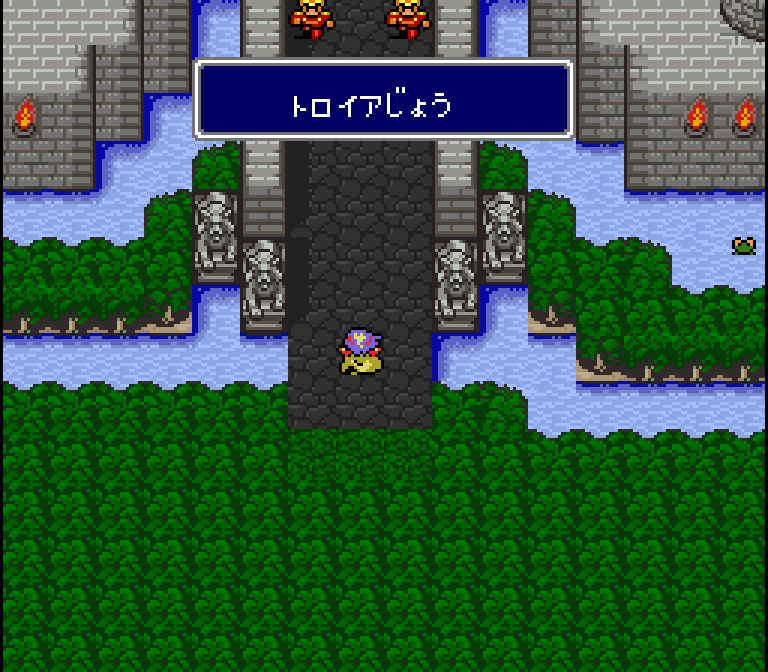 | 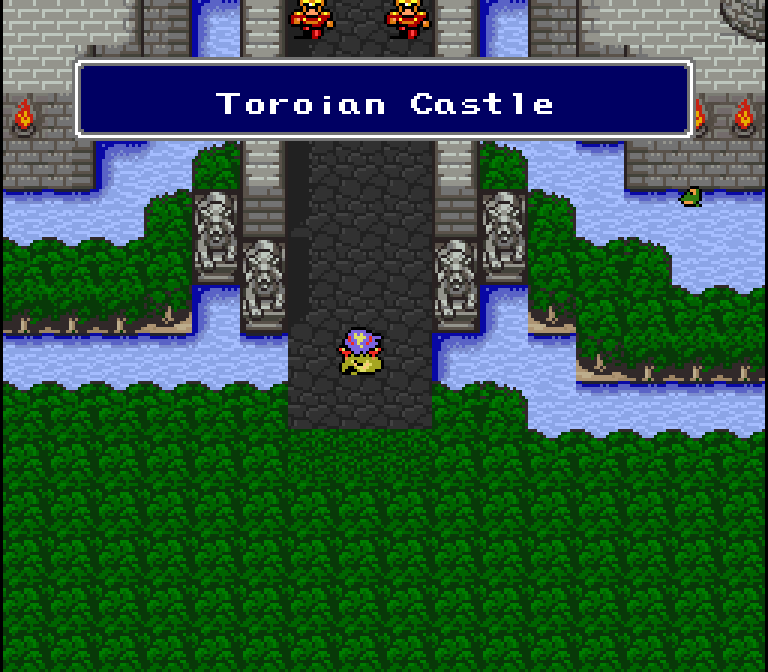 |
| Final Fantasy IV (Super Famicom) | Final Fantasy II (Super NES) |
In the Japanese version of the game, this place is called “Troia Castle” or “Castle Troia”. The translation makes the name an adjective and goes with “Toroian Castle”.
This is perfectly fine, I just find it interesting that this was handled differently than Baron Castle, which we saw was simply called “Baron” in the translation. For consistency, it might’ve been better to simply translate this as “Toroia” or to call Baron Castle “Baronian Castle”.
Of course, that’s being super-nitpicky – I’m sure no one else has even noticed or batted an eye at this issue until now.
Welcome Wagon
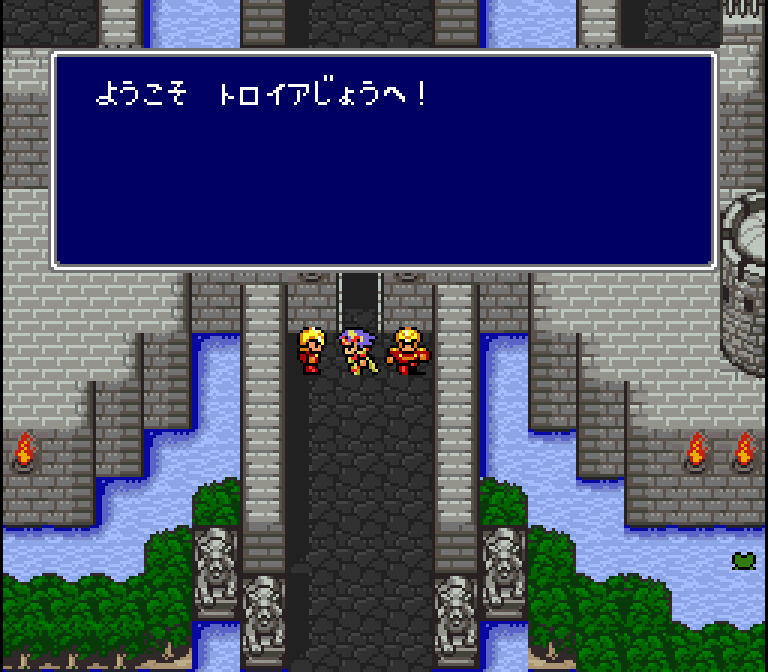 | 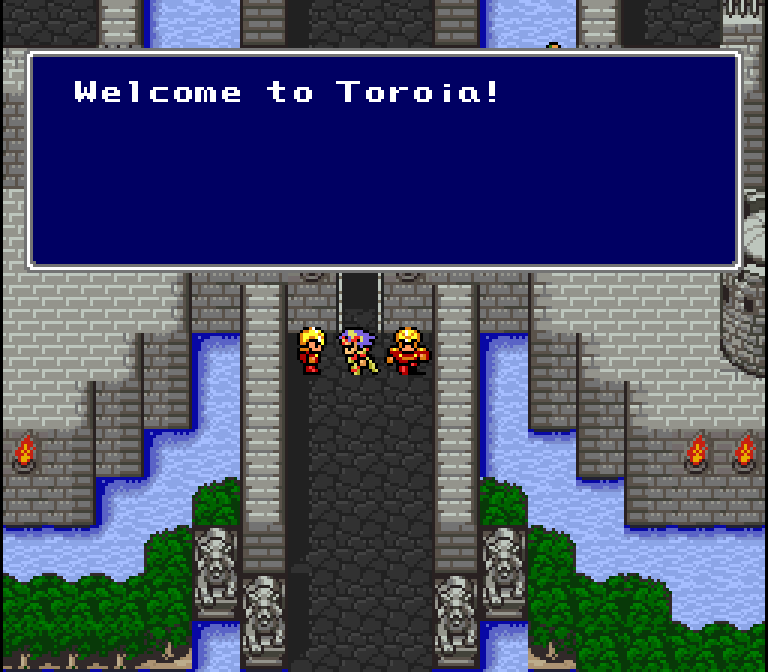 |
| Final Fantasy IV (Super Famicom) | Final Fantasy II (Super NES) |
It’s been established in the translation that this is the “Toroian Castle”. So when you talk to the guards at the gate, it’s interesting to see a different translation choice:
| Japanese Version (basic translation) | English Version |
| Welcome to Castle Troia! | Welcome to Toroia! |
So it looks like the translators decided to trim the name down after all. I’m assuming it was for technical space issues.
Take it Easy
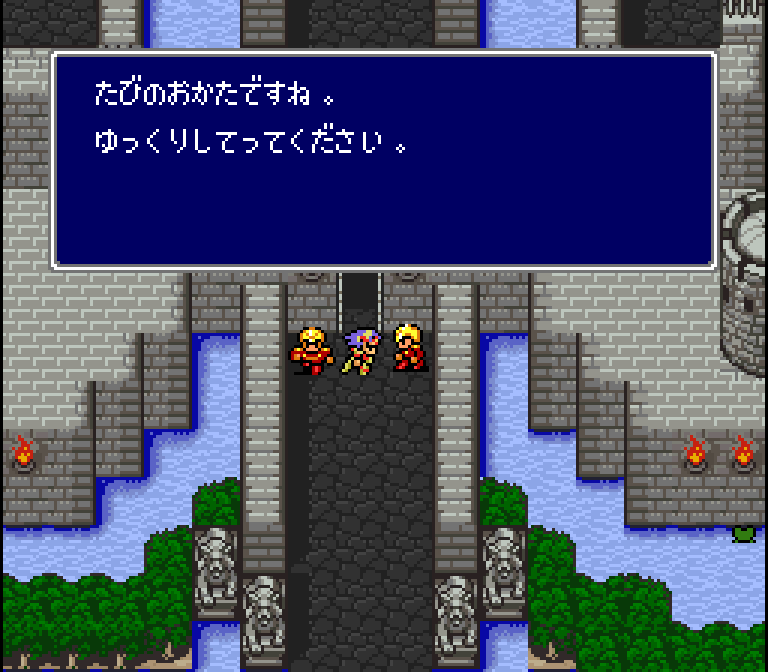 |  | 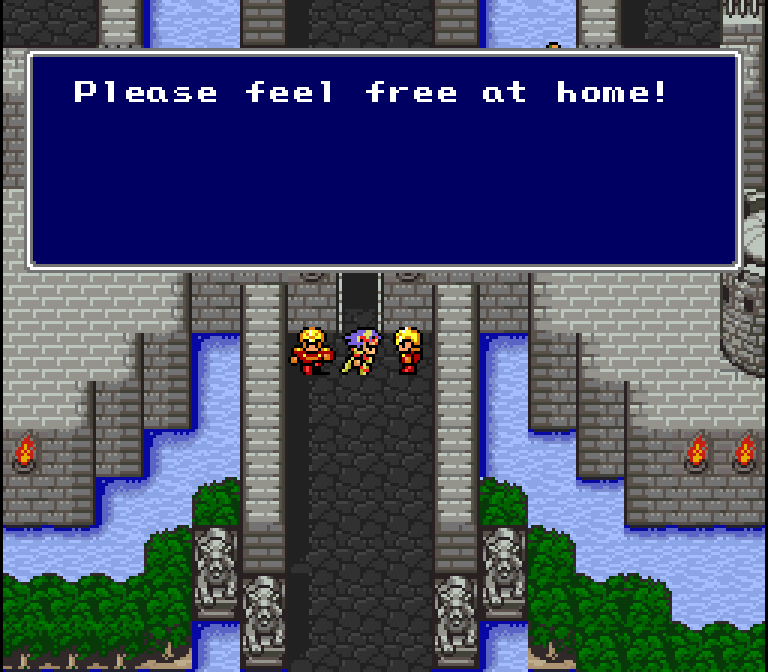 |
| Final Fantasy IV (Super Famicom) | Final Fantasy IV Easy Type (Super Famicom) | Final Fantasy II (Super NES) |
Another guard welcomes Cecil and company:
| Japanese Version (basic translation) | English Version |
| You must be travelers. | |
| Please feel free to relax. | Please feel free at home! |
A line was dropped from the English translation. No huge deal, though.
Slightly more interesting is that this not particularly important line was modified for the Easy Type release – it just adds a space into part of the first line for slightly improved readability and then rephrases a word a tiny bit.
Frogs Everywhere
 | 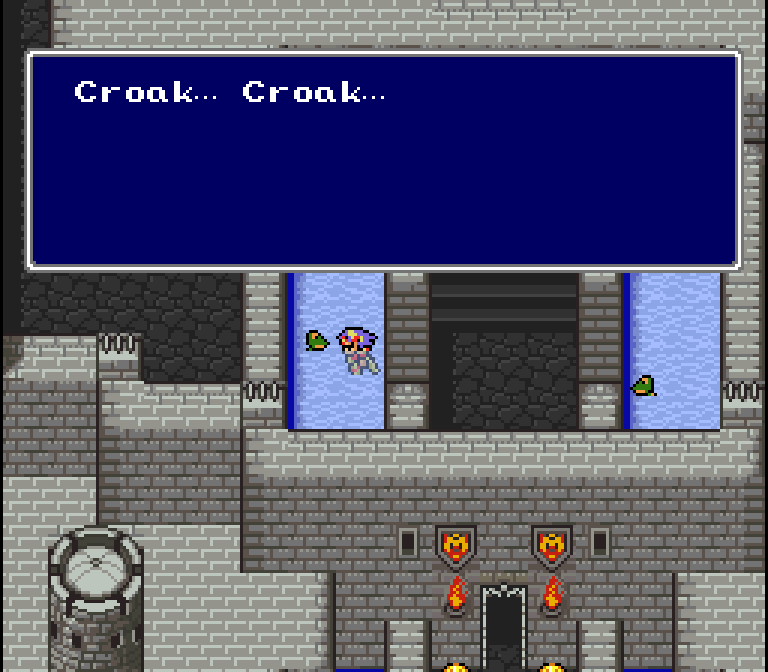 |
| Final Fantasy IV (Super Famicom) | Final Fantasy II (Super NES) |
If you’re a clever player, you might find a secret way to get into the moat. And in the moat you can talk to the frogs!
In the Japanese version of the game, they make loud frog sounds. In the English version they do the same, although the exclamations are replaced with ellipses and sometimes vice-versa.
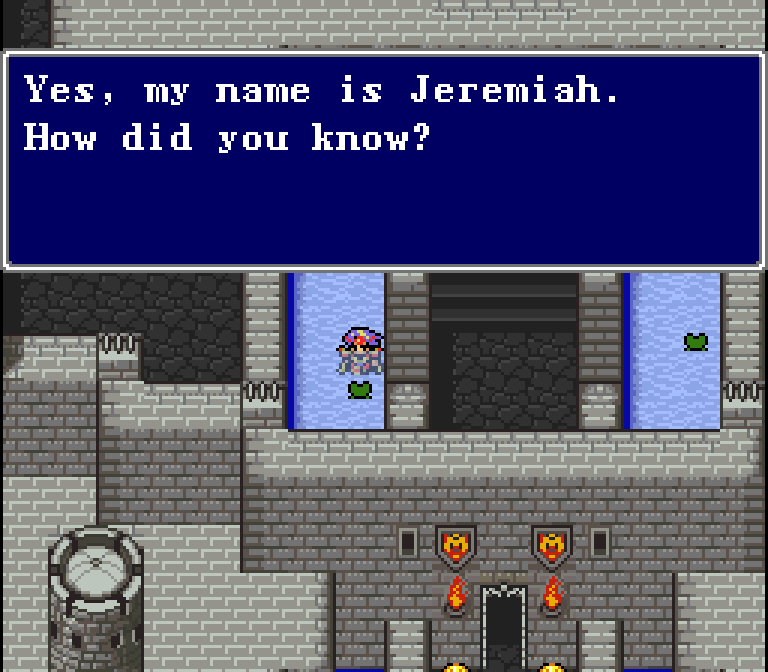
The fan translation changes all the frogs’ text to include American pop culture jokes.
One is, “Yes, my name is Jeremiah. How did you know?” This is a reference to the famous opening line of a Three Dog Night song: “Jeremiah was a bullfrog!”
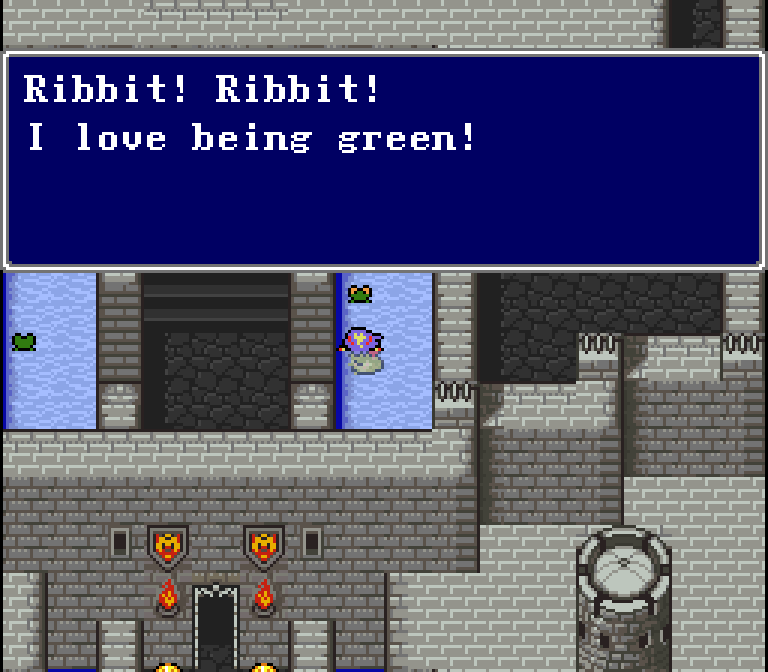 |  |
Another line in the fan translation is, “Ribbit! Ribbit! I love being green!” This is a reference to the Kermit the Frog song, “Bein’ Green”.
Of course, the original Japanese script didn’t include any pop culture references. What’s weirdest about this treatment, though, is that it results in multiple frogs saying the Kermit line and the Jeremiah line, not just one. It comes off as pretty strange, but as they’re semi-secret lines to begin with it probably doesn’t matter too much.
A Vocal Minority
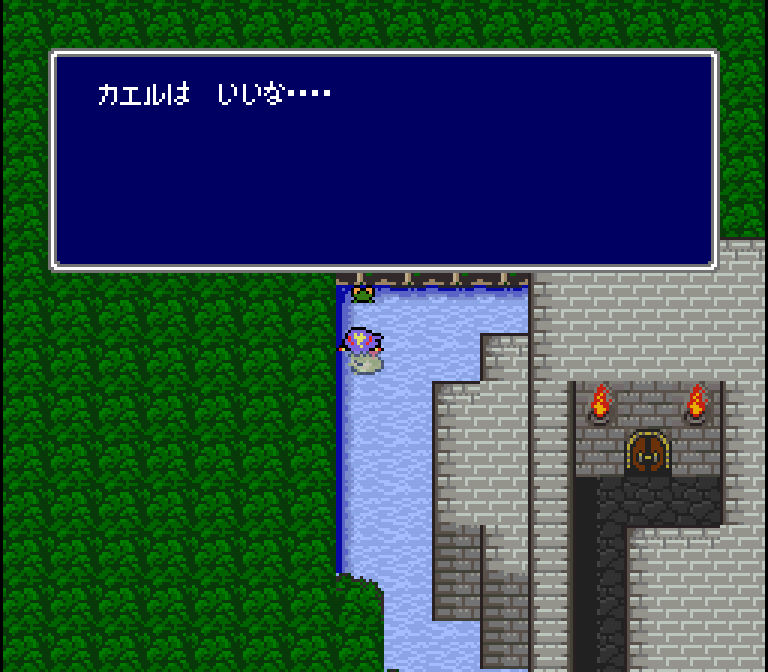 | 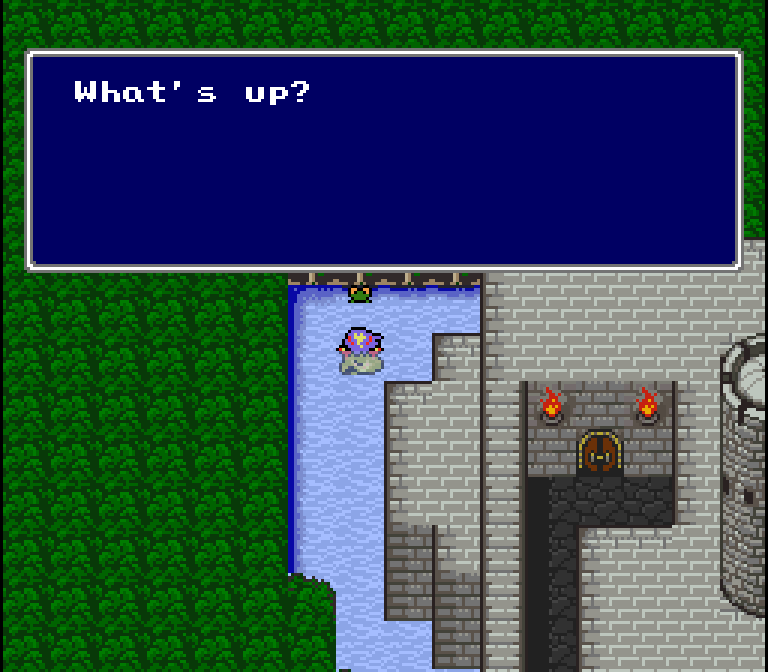 |
| Final Fantasy IV (Super Famicom) | Final Fantasy II (Super NES) |
The Japanese version of the game makes it so that all the frogs here make frog sounds, as you might expect. Except for one unique frog that can speak human language.
In Japanese, this frog says something like, “Frogs sure have it nice….” or “It’s nice being a frog….”
The official English translation changes this to, “What’s up?”
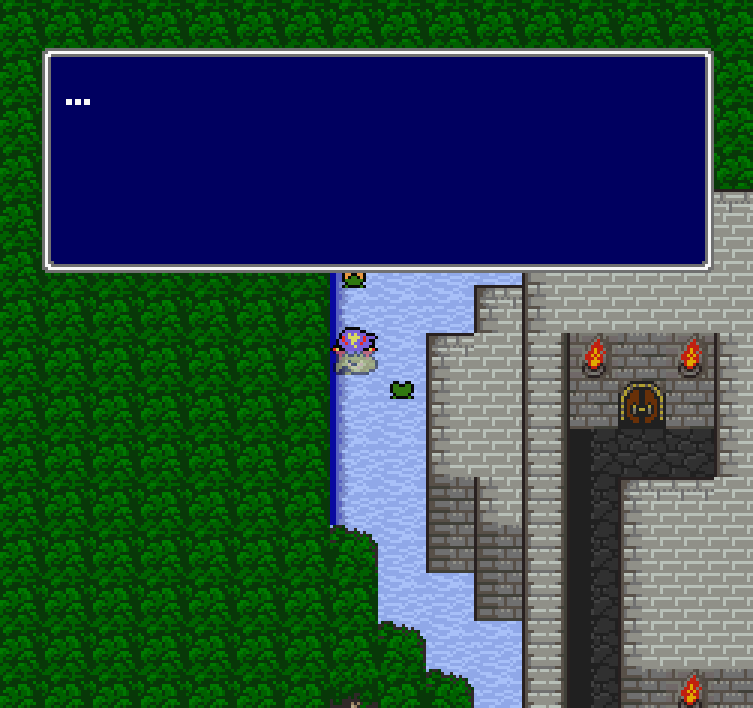
The PlayStation translation changes things further and just goes with, “…” This ruins the little bit of fun the game designers intended though – that there’s actually a hidden talking frog among these regular frogs.
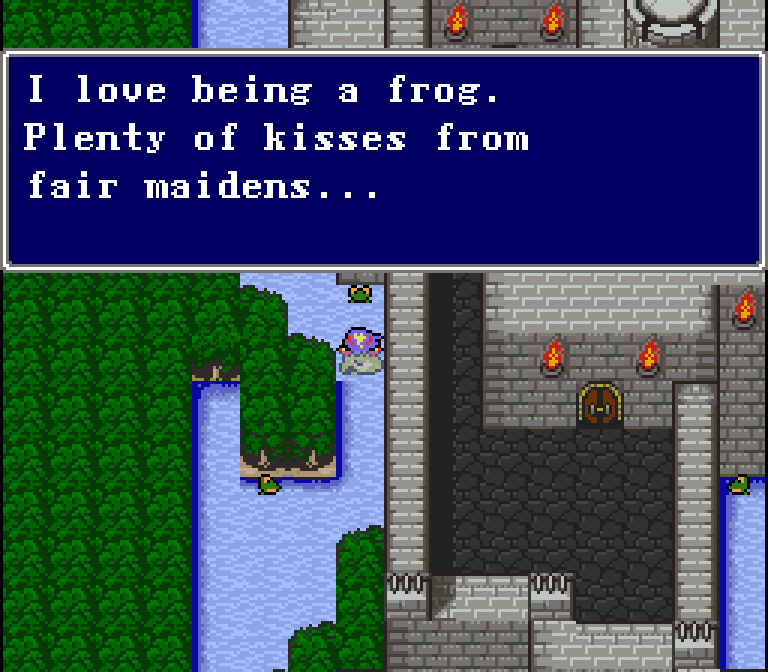
As seen earlier, the fan translation just makes all the frogs talk, which goes against the original intent of all the text here. So the line for this particular frog was changed to say, “I love being a frog. Plenty of kisses from fair maidens…”
About About
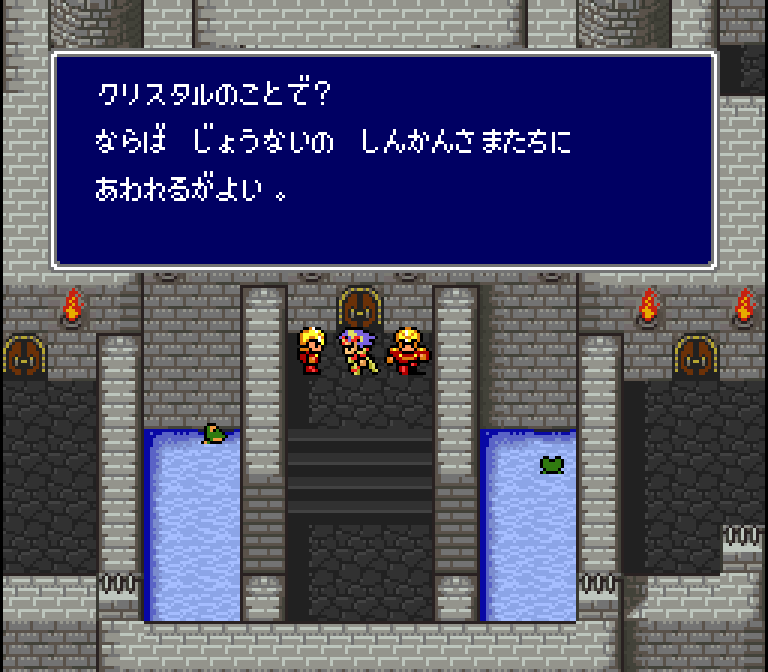 | 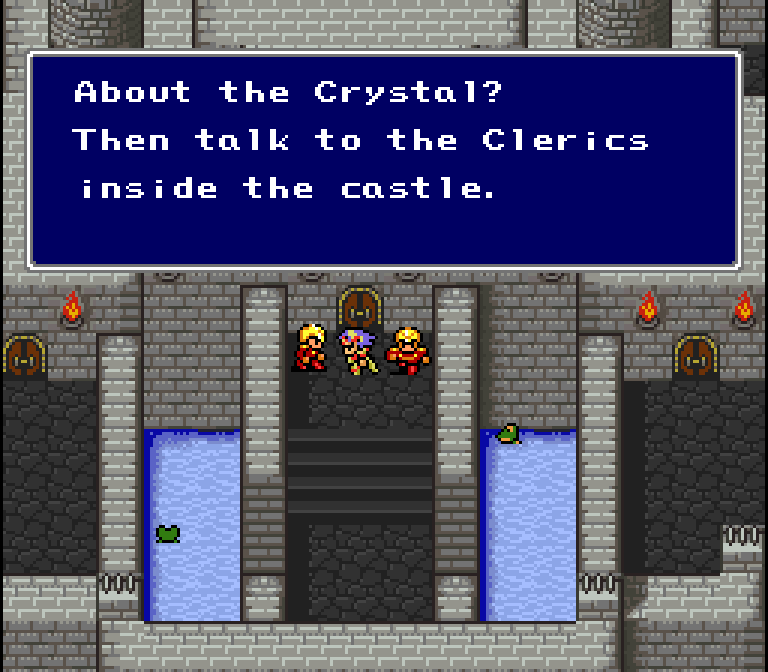 |
| Final Fantasy IV (Super Famicom) | Final Fantasy II (Super NES) |
Another guard has some info for you:
| Japanese Version (basic translation) | English Version |
| You’re here about the crystal? | About the Crystal? |
| In that case, please meet with the priestesses inside the castle. | Then talk to the Clerics inside the castle. |
The English line has a bit of a “trimmed down” vibe, or at least it sounds a little unnatural. Also of note is that their name is a little more akin to “priests” or “priestesses” than “clerics”, possibly with a bit of a Shinto sort of feel, although not necessarily. I think “priestess” would’ve been a really nice choice as it immediately lets you know that they’re all female, but in the end it’s not a huge difference. I imagine using things like “priest” or “priestess” might’ve been a no-no with Nintendo back then anyway.
Part of me also wonders if “Clerics” should be capitalized like that, but I guess it could work if you say it’s the proper name of their group or something.
I should also mention that this guard speaks to Cecil and friends in a very polite, slightly archaic way in Japanese.
The Clerics
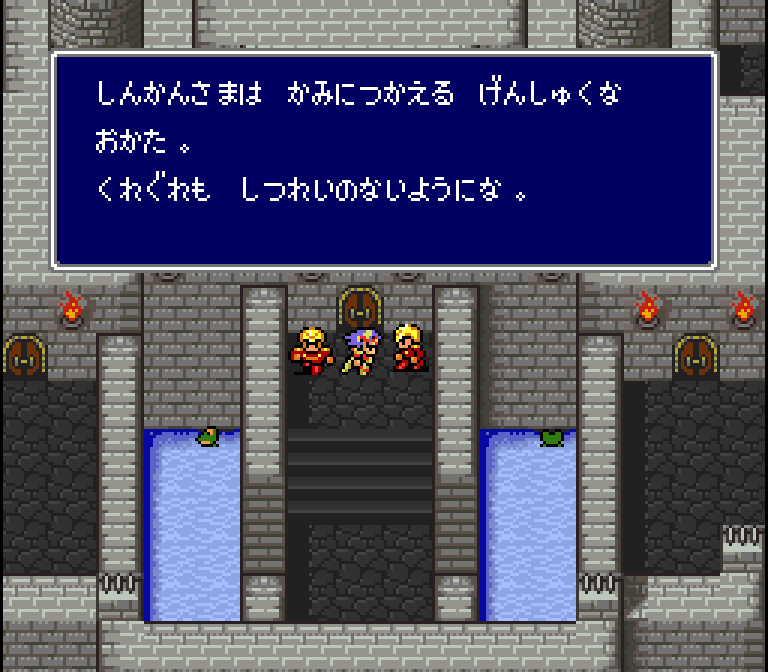 | 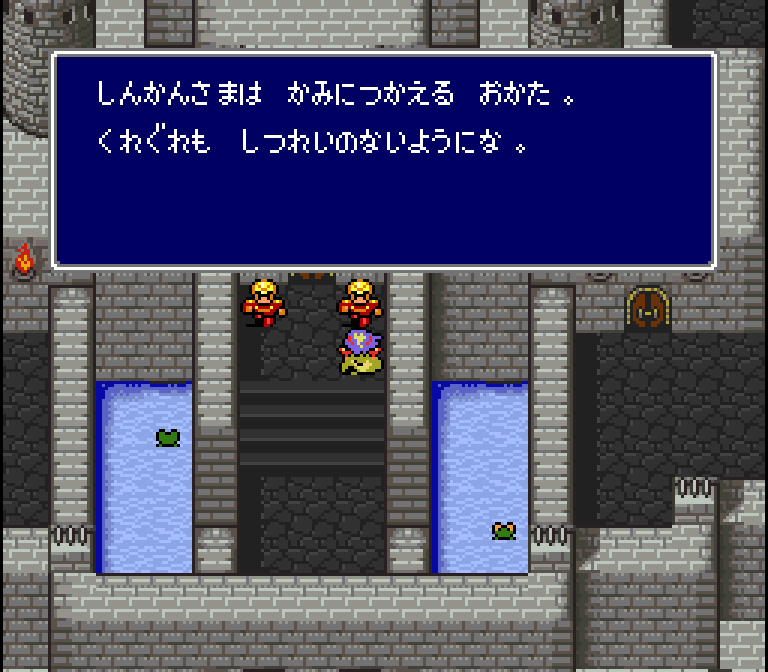 | 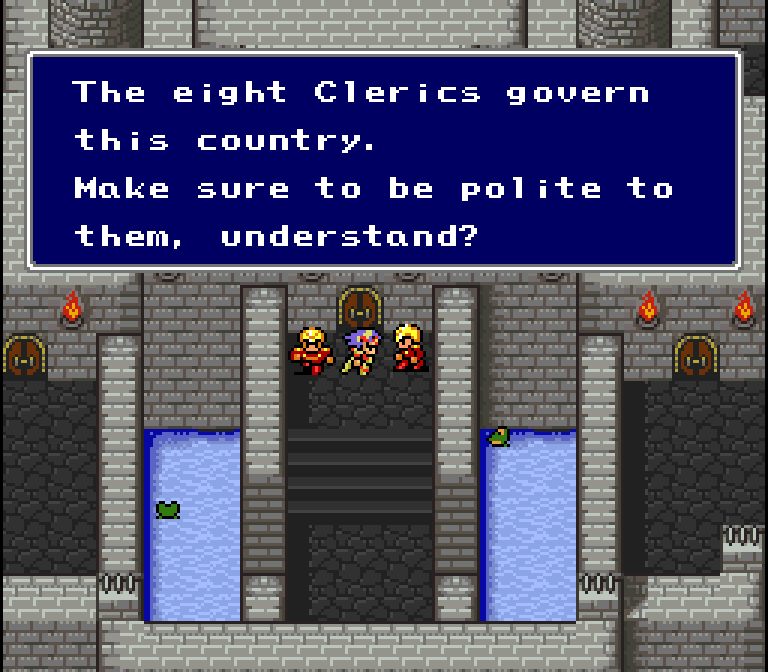 |
| Final Fantasy IV (Super Famicom) | Final Fantasy IV Easy Type (Super Famicom) | Final Fantasy II (Super NES) |
The other guard nearby gives helpful information as well:
| Final Fantasy IV (basic translation) | Final Fantasy IV Easy Type (basic translation) | Final Fantasy II (Super NES) |
| The priestesses are solemn personages who serve the gods. | The priestesses are personages who serve the gods. | The eight Clerics govern this country. |
| Please take extra care not to do anything rude. | Please take extra care not to do anything rude. | Make sure to be polite to them, understand? |
So it looks like the religious aspect of these women was written around in the translation. And the Easy Type version shortened one of the lines by taking out a fancy Japanese word.
Also, the Japanese word used here, “kami”, could refer to a god, THE God, multiple gods, or even the Shinto term for spirits or deities and such.
It’s always tough to know which is intended when translating Japanese entertainment, so sometimes the safest choice is to just say “the divine”. I’m not sure why the translators didn’t go with that choice, but maybe it was just to be extra, super-duper careful.
The English version also gives more new info than the original text – that there are eight of these cleric people.
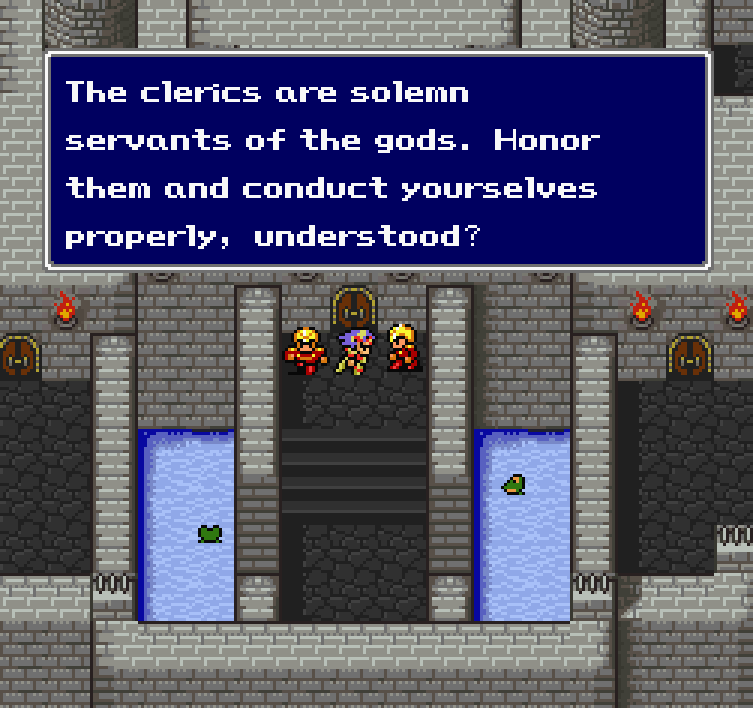
The PlayStation translation handles this line with:
The clerics are solemn servants of the gods.
Honor them and conduct yourselves properly, understood?
It seems the PlayStation translation kept the “clerics” choice but put the religious reference back in. Nice!
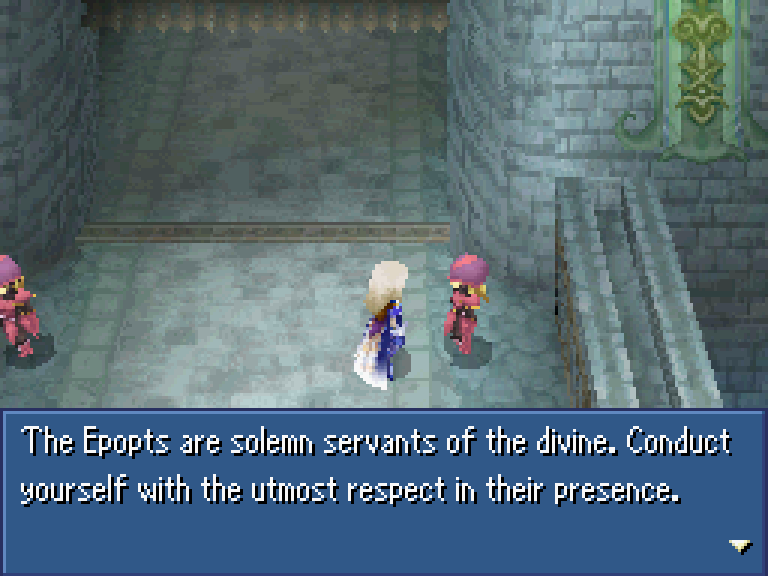
The DS translation handles this in an interesting way too:
The Epopts are solemn servants of the divine.
Conduct yourself with the utmost respect in their presence.
There it is – the “divine” choice. Cool! It also seems that this version considers the group of clerics to be a special group with a proper name: the Epopts.
…But what the heck is an “epopt”?!
Checking some dictionaries, it seems to refer to someone initiated into a secret system of some sort.
I guess that fits, and the fanciness of the term fits the importance of the women in question. It’s kind of funny, though; the Easy Type version of the game simplified the game’s text for players, but the DS version’s translation is like the exact opposite – you need a dictionary by your side to fully understand some things!
Also of minor note is that the PlayStation translation goes with “yourselves” here while the DS version goes with the singular “yourself”. The Japanese leaves the subject of the sentence out completely, so it’s unclear who exactly the guard is talking to. Is it one person in the party or everyone? As a translator, you just gotta take your best guess.
All Washed Up
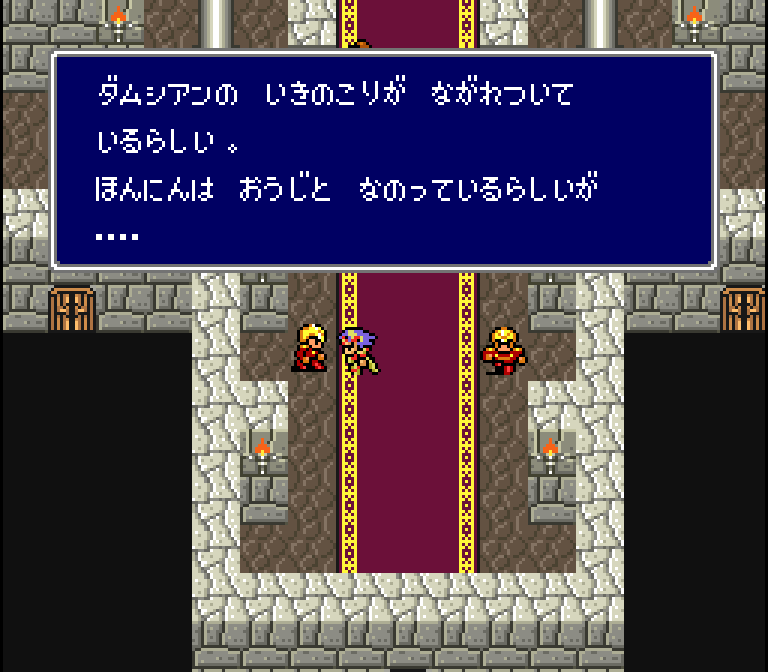 | 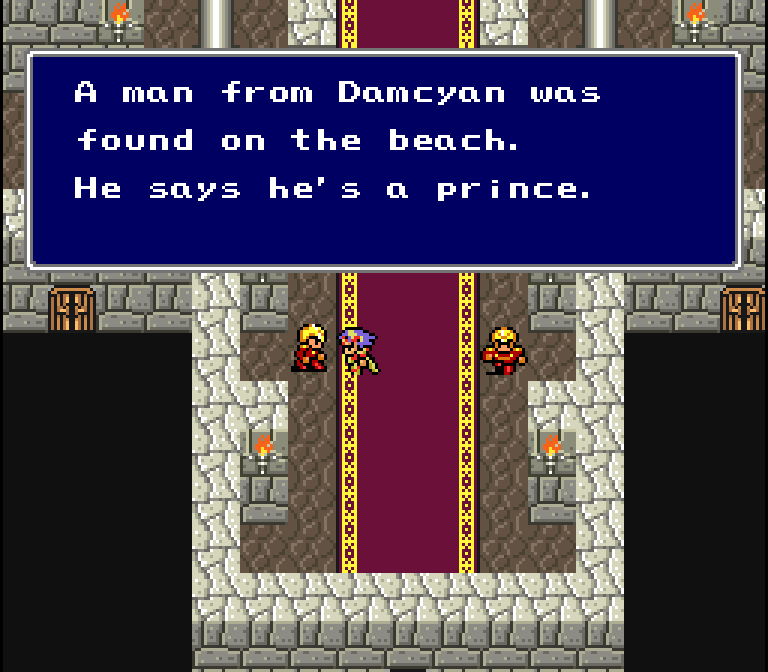 |
| Final Fantasy IV (Super Famicom) | Final Fantasy II (Super NES) |
A guard inside the castle talks about a mystery man:
| Japanese Version (basic translation) | English Version |
| It sounds like a survivor of Damcyan has washed up here. | A man from Damcyan was found on the beach. |
| He claims to be a prince, but… | He says he’s a prince. |
The Japanese text suggests that the news of Damcyan’s destruction has spread across the world, and that survivors are rare enough to be noteworthy. This guard also seems to have some doubts that the person is actually a prince.
The English translation loses some of the nuance – the news of Damcyan’s destruction is left out, and the hearsay and doubt is missing too.
But the main purpose of the line is still kept intact – someone from Damcyan washed up and he says that he’s a prince. This is meant to sound familiar to the player. So in terms of practicality, this line’s translation isn’t too bad.
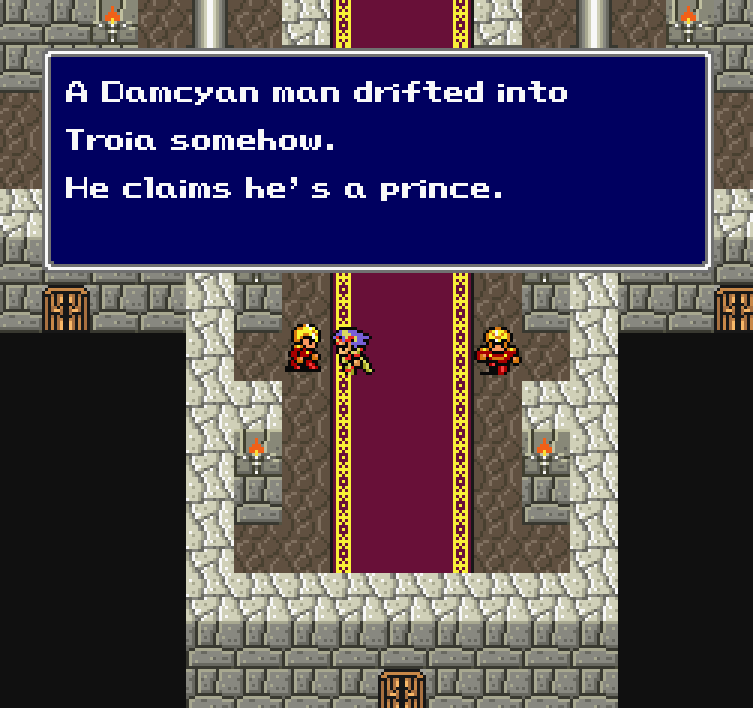
The PlayStation translation handles this line with:
A Damcyan man drifted into Troia somehow.
He claims he’s a prince.
There’s a genuine mistranslation in this line – ながれつく has two different meanings, one is “to drift ashore” or “to wash up”, and one is “to drift into” or “to wander into”.
The PlayStation translation went with the “wander” meaning, but based on the full context, the “got washed up” meaning was the original intention. After all, Cecil and company were attacked by Leviathan in the middle of the ocean, and all the party members got taken in different directions. In fact, Cecil himself got washed up onto a shore near Mysidia.
As such, the PlayStation translation’s inclusion of “somehow” seems a bit strange too. There was no confusion in the original text – the Damcyan guy simply washed up near Toroia.
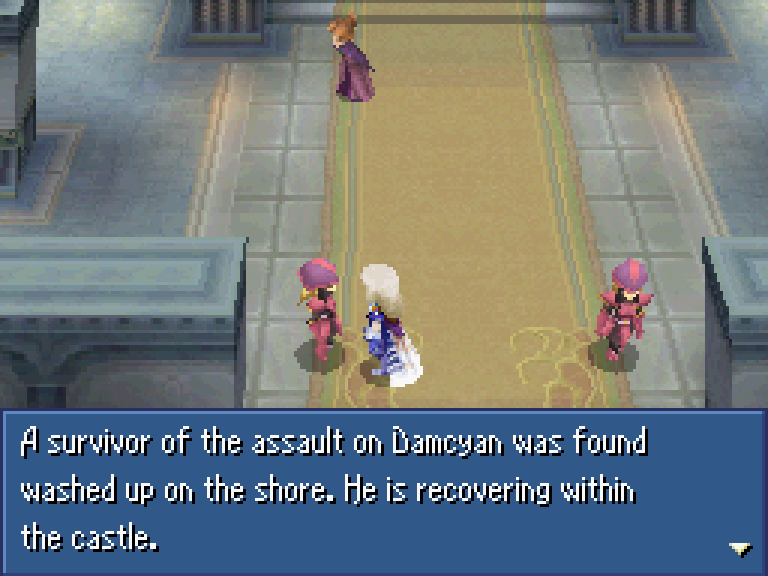
This mistake lives on in the GBA and I assume the PSP translation, but the DS translation fixes it with:
A survivor of the assault on Damcyan was found washed up on the shore.
He is recovering in the castle.
The man claims to be a prince, although that is not something I am inclined to believe.
So it looks like the survivor part, the washed up part, the hearsay, and the doubtfulness were all retained. Nice!
The line about him recovering in the castle seems to be new, but I suppose it’s possible that was added into the Japanese DS version too.
War More
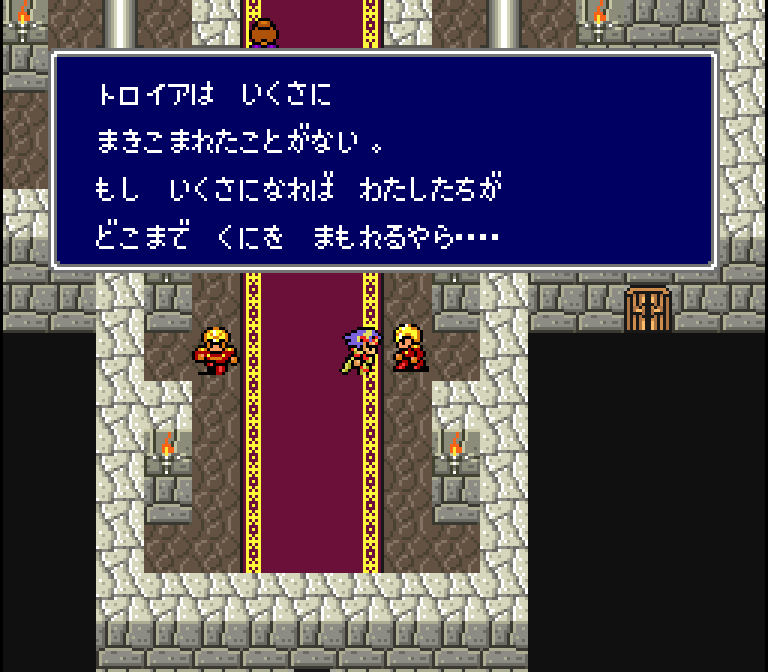 | 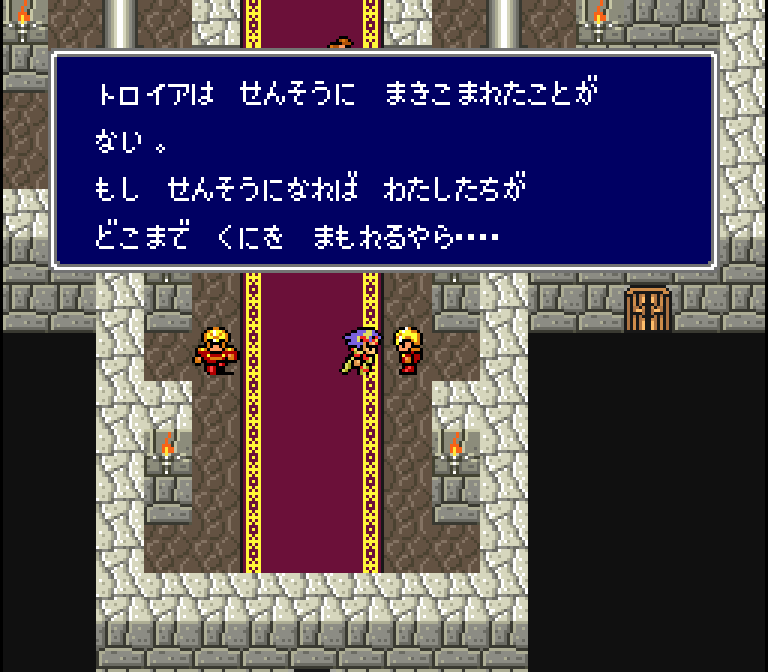 | 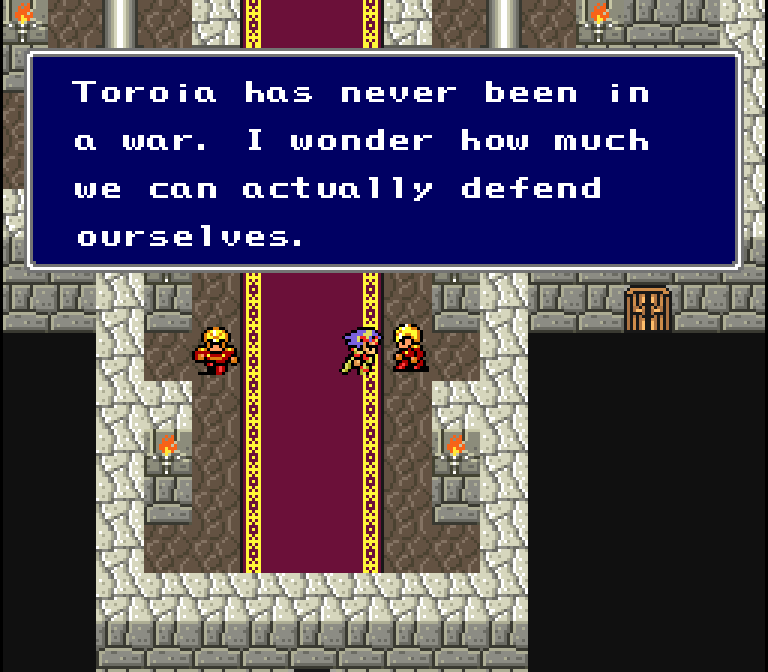 |
| Final Fantasy IV (Super Famicom) | Final Fantasy IV Easy Type (Super Famicom) | Final Fantasy II (Super NES) |
A different guard talks about Toroia’s readiness for war:
| Final Fantasy IV (basic translation) | Final Fantasy IV Easy Type (basic translation) | Final Fantasy II (Super NES) |
| Troia has never been involved in hostilities. | Troia has never been involved in a war. | Toroia has never been in a war. |
| Should hostilities break out, who knows how well we can protect our land…. | Should war break out, who knows how well we can protect our land…. | I wonder how much we can actually defend ourselves. |
The English translation leaves out the conditional statement, which you could possibly take to mean that war is inevitable and imminent, like they know an attack is already coming. But it’s not a big deal, and I’m actually impressed that all of the original text could be squished down into one English text box.
More interesting is that the Easy Type’s script replaces an older, fancier word for “war” with the more common term. It does this twice in this line. The text was also reformatted a bit for the Easy Type version.
Something Baron
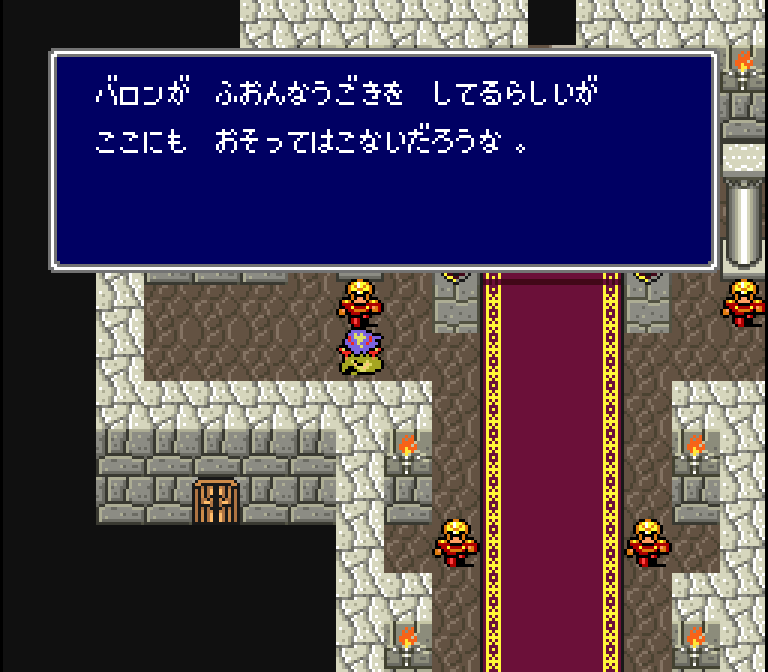 | 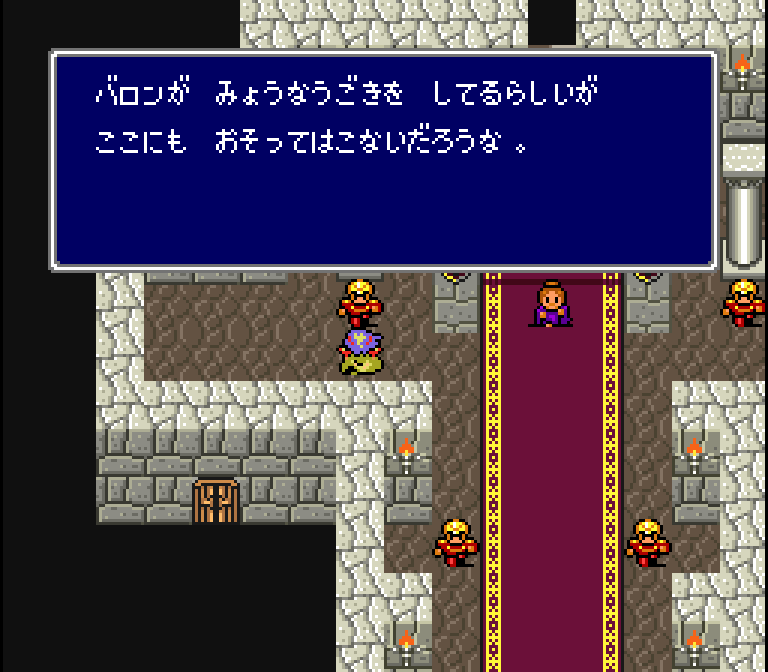 | 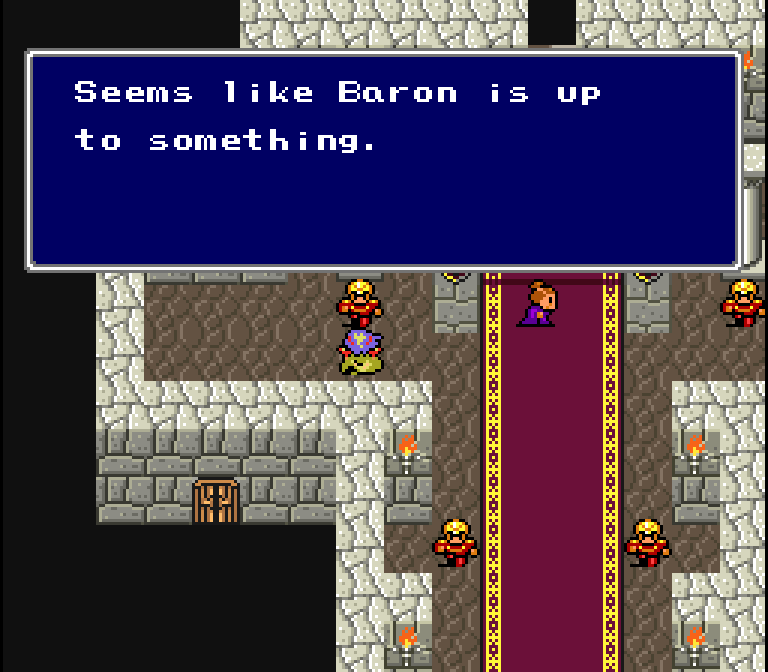 |
| Final Fantasy IV (Super Famicom) | Final Fantasy IV Easy Type (Super Famicom) | Final Fantasy II (Super NES) |
Another guard is worried about Baron:
| Final Fantasy IV (basic translation) | Final Fantasy IV Easy Type (basic translation) | Final Fantasy II (Super NES) |
| It sounds like Baron is acting conspicuously; I hope they don’t attack here, too. | It sounds like Baron is acting strangely; I hope they don’t attack here, too. | Seems like Baron is up to something. |
The English translation shortens the line by chopping off the second half entirely. The guard no longer seems worried about an attack, she’s just giving basic information now.
Another way to look at it is that someone playing the Japanese version could say to the TV screen, “Nope, no need to worry! I saved Baron and now they’re not gonna attack you!”
Someone playing the English version could only say, “No, not really.”
Also, as seen before, the Easy Type version of the script changes a fancy Japanese word here into a simpler one.
Maid in Toroia
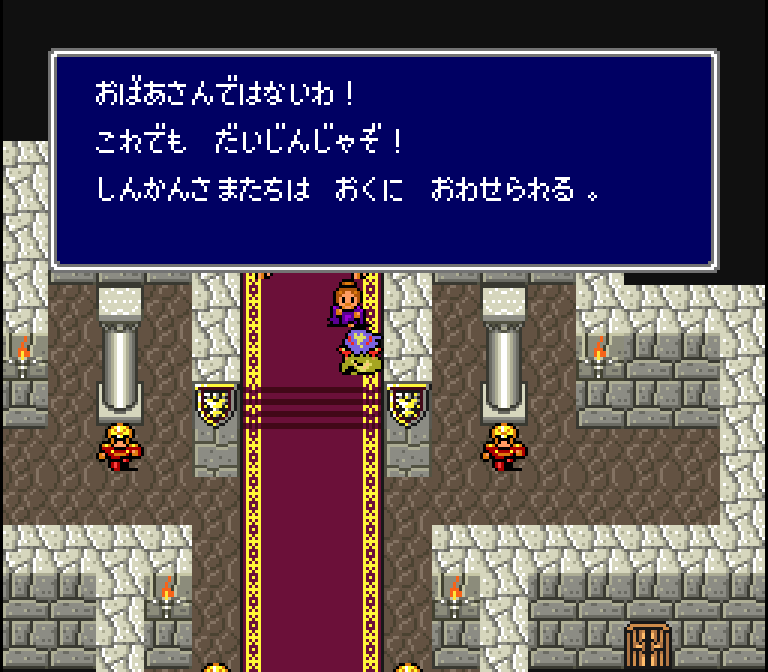 | 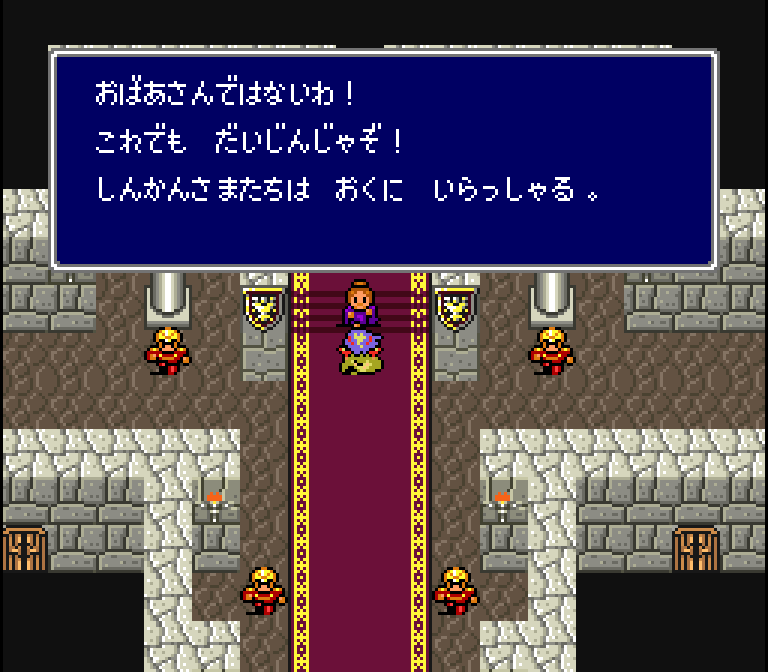 | 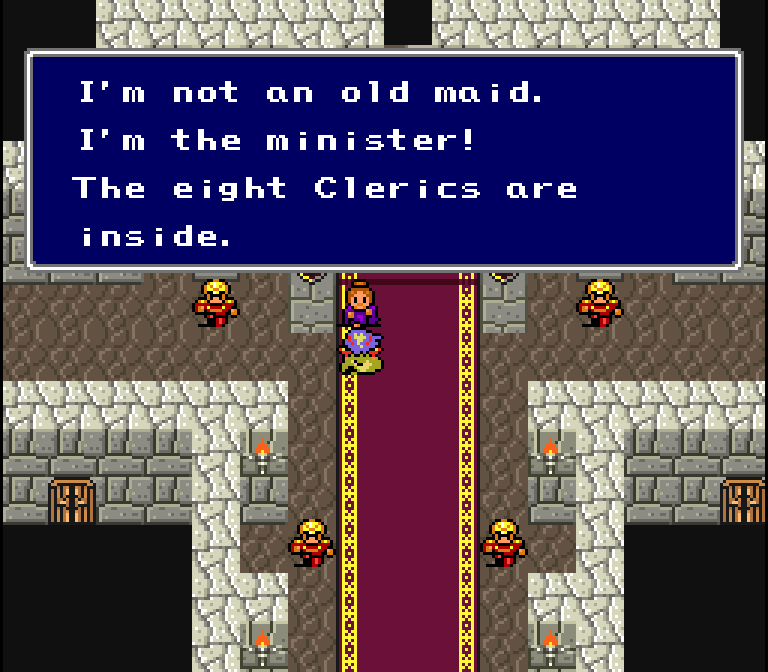 |
| Final Fantasy IV (Super Famicom) | Final Fantasy IV Easy Type (Super Famicom) | Final Fantasy II (Super NES) |
An old lady walks around the castle:
| Japanese Version (basic translation) | English Version |
| I’m no old hag! | I’m not an old maid. |
| I’m the minister, I’ll have you know! | I’m the minister! |
| The priestesses are inside. | The eight Clerics are inside. |
In Japanese, she talks in an “old lady” speech style. She also refers to the priestesses in an extremely reverent, respectful way.
The English translation is fine for what it needs to be. I find it interesting that again the translators chose to include the number of Clerics; the original text makes no mention of this.
The Easy Type version of the script changes her extra-polite text to something a little more understandable while also retaining its super-politeness.
Gender Gap
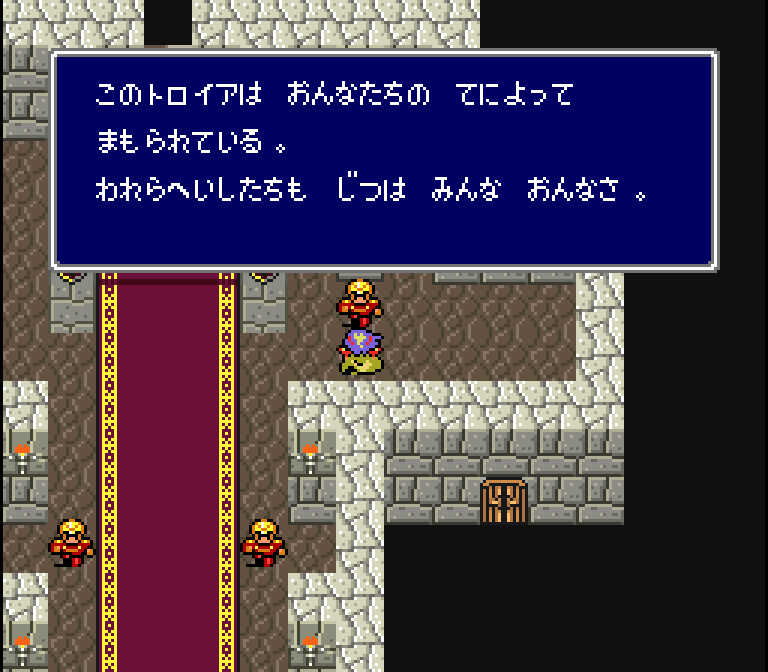 |  |
| Final Fantasy IV (Super Famicom) | Final Fantasy II (Super NES) |
One of the guards reveals something that might come as a surprise:
| Japanese Version (basic translation) | English Version |
| This land of Troia is defended by women. | Toroia is ruled by women. |
| Even we soldiers are actually all women. | Troops and soldiers are all women, too! |
| Me? Of course! |
The English translation adds a line to the end. It also changes the topic of the first line from military stuff to political stuff.
No Dance
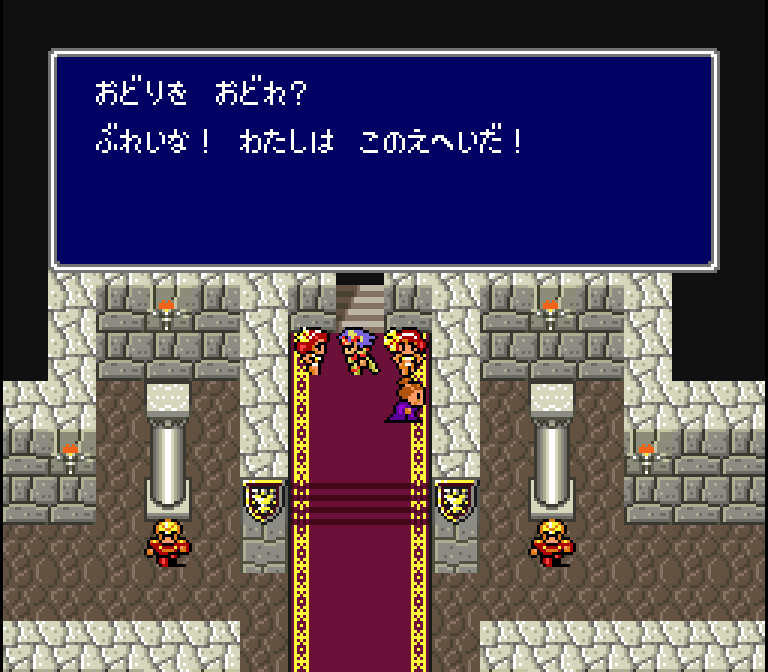 | 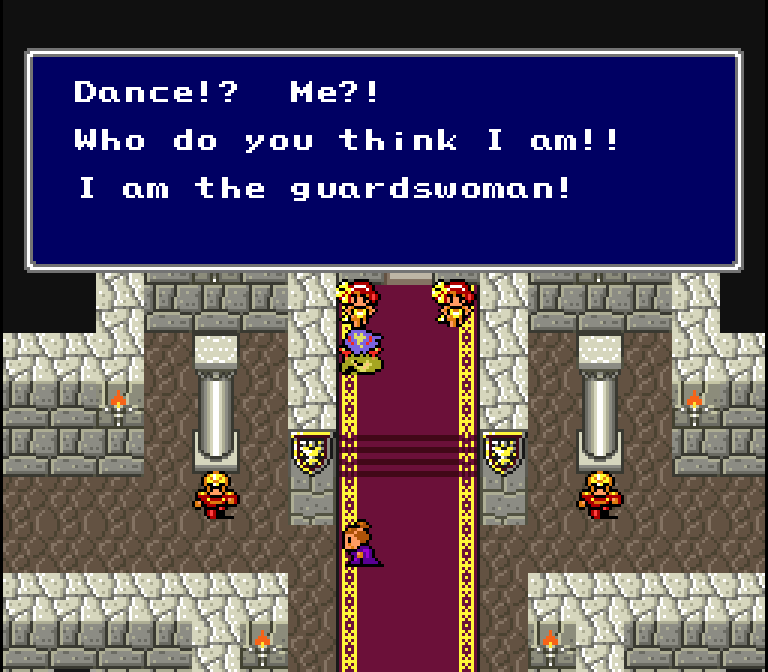 |
| Final Fantasy IV (Super Famicom) | Final Fantasy II (Super NES) |
There are two women dressed like dancers in this area of the castle. One of them gets offended that you’d mistake her for a dancer:
| Japanese Version (basic translation) | English Version |
| Do a dance? | Dance!? Me?! |
| How rude! I’m a member of the Royal Guard! | Who do you think I am!! I am the guardswoman! |
It took me a long time to realize that she says this because until now almost every area has had a similar-looking girl who’ll do a dance for you. But this time she’s not a dancer – she’s an elite guard.
Anyway, what I find really interesting about this translation is:
- The decision to translate the word as “guardswoman” is interesting, as the Japanese text actually doesn’t mention gender at all. The term is essentially the same as what Baigan and the other big-shot Baron guards were, which was previously translated as “Royal Guard”. So the fact that “guardswoman” was used here means someone likely checked the translated line in-game, saw the context, and then revised it to add in the gender mention.
- The translation of “Dance!? Me?!” is pretty good! The punctuation is a little odd, though. I don’t know what to make of this particular mixing of “!?” and “?!”, especially since neither was in the original line. There’s also an unusual double space here.
- The choice of “Who do you think I am” for “How rude” is interesting too – this and the previous sentence also suggest that an editor polished up this line a bit. The use of double exclamations is unusual for this game’s translation too.
- This “I am the guardswoman!” line is a model example of the difficulty that native Japanese speakers have with “a” and “the” in English. But if an editor did polish the other sentences in this bit of text, it seems weird that this would be left as-is. So now I don’t know what to think at all!
Combat Fashion
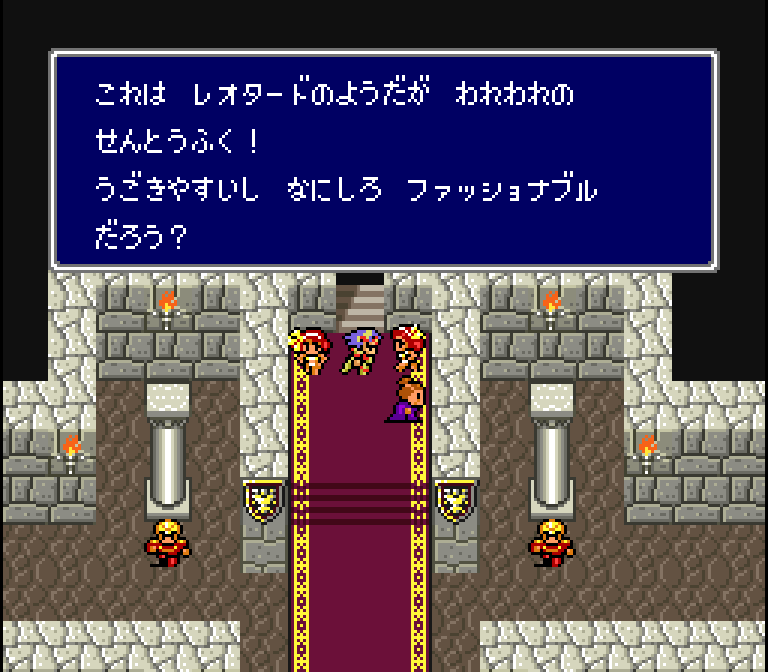 | 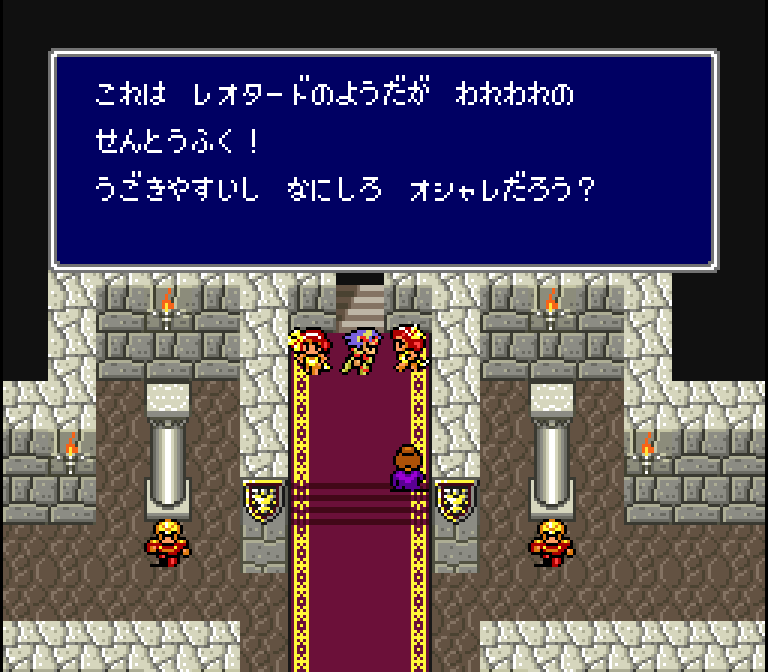 | 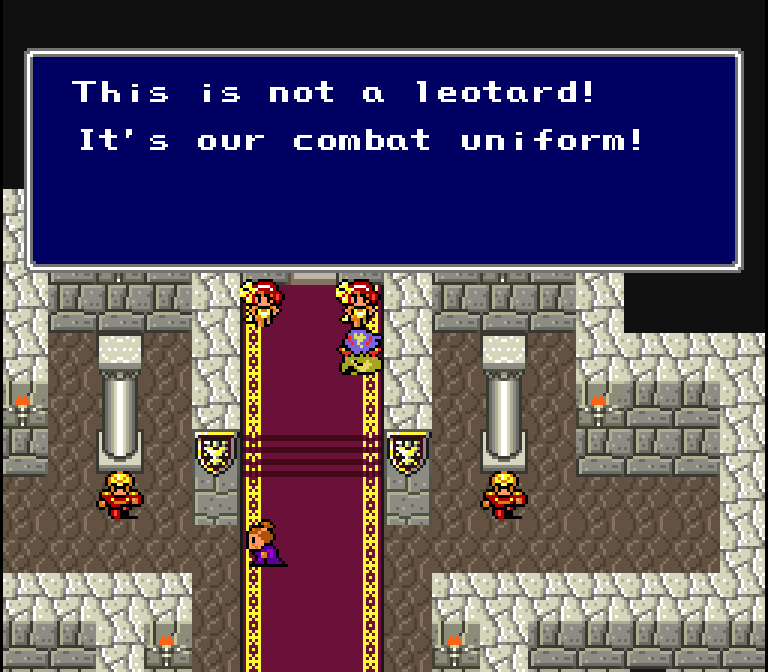 |
| Final Fantasy IV (Super Famicom) | Final Fantasy IV Easy Type (Super Famicom) | Final Fantasy II (Super NES) |
The other dancer-ish lady talks about their clothing:
| Final Fantasy IV (basic translation) | Final Fantasy IV Easy Type (basic translation) | Final Fantasy II (Super NES) |
| This is like a leotard but it is our combat outfit! | This is like a leotard but it is our combat outfit! | This is not a leotard! |
| It’s easy to move around in, and more than anything, it’s fashionable, wouldn’t you say? | It’s easy to move around in, and more than anything, it looks stylish, wouldn’t you say? | It’s our combat uniform! |
The English translation leaves out the final line, which is supposed to explain why these unusual outfits are used as their combat uniforms.
The Easy Type version also replaces the English word “fashionable” with what’s more or less the Japanese equivalent. This was probably done to ensure that Japanese players of all ages and backgrounds would understand the line.
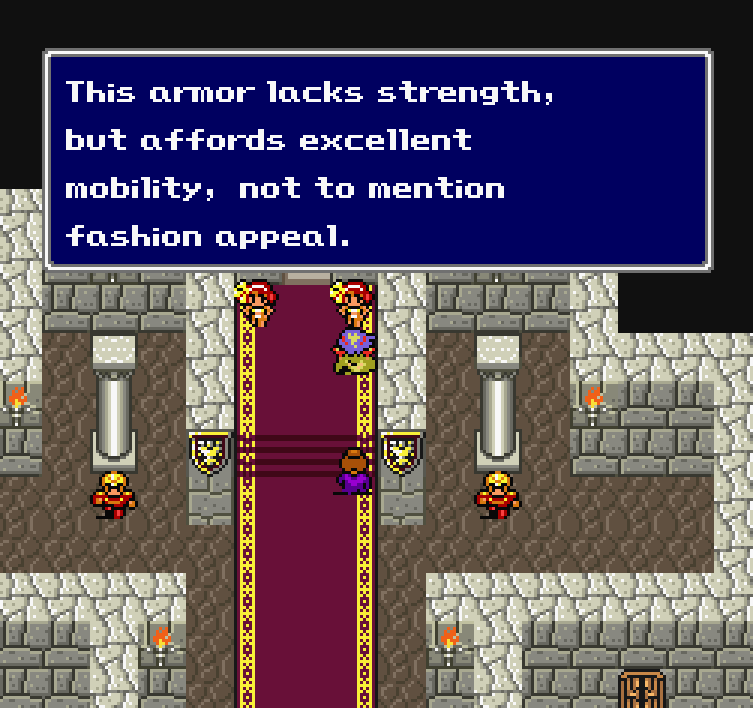
In the PlayStation translation, this line was handled with:
This armor lacks strength, but affords excellent mobility, not to mention fashion appeal.
This is pretty good, but it leaves out the tiny bit of intended humor in the original text – that Cecil’s party and/or the player has mistaken her combat uniform for a leotard.
They’re Sisters
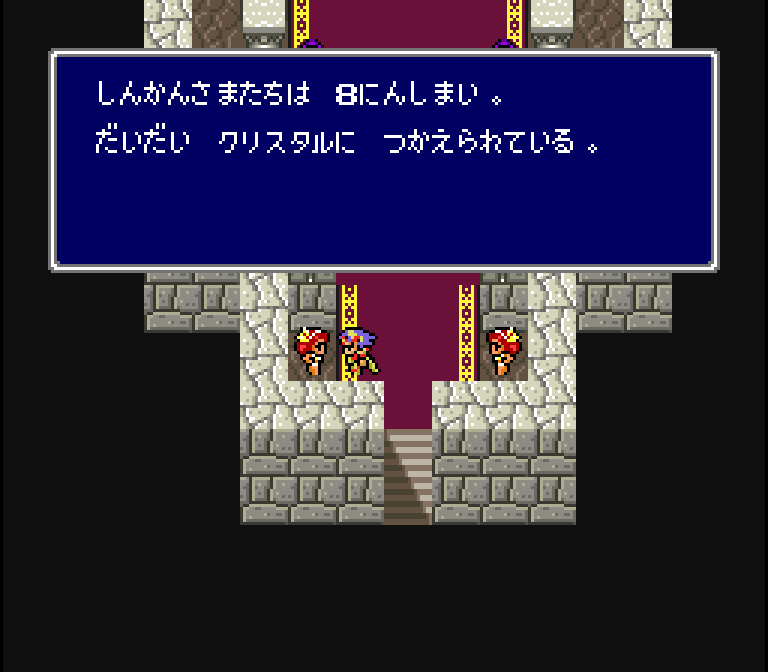 | 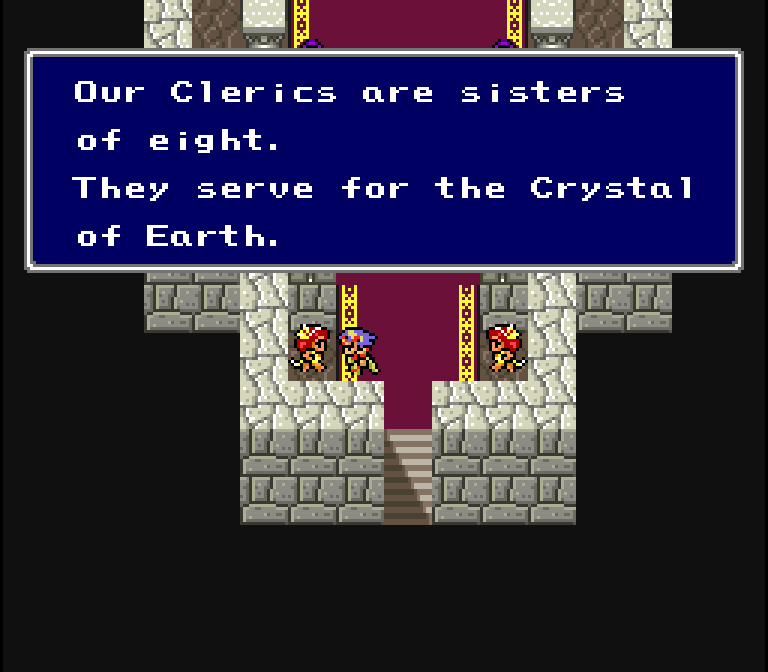 |
| Final Fantasy IV (Super Famicom) | Final Fantasy II (Super NES) |
One of the leotard girls in the inner chamber explains about the women here:
| Japanese Version (basic translation) | English Version |
| The priestesses are eight sisters. | Our Clerics are sisters of eight. |
| They serve the crystal, one generation to the next. | They serve for the Crystal of Earth. |
The first sentence in the English translation is actually really well-phrased. It makes me think it was written or edited by a native English speaker. The second line has a bit of a grammar hiccup, though, which is odd.
The English translation also specifically states which crystal they’re talking about, while the Japanese text just says “crystal”. It’s interesting to see the English translation add more details to things in this part of the game. It seems to have been done intentionally, so I guess someone on the localization team was like, “Okay, let’s clarify this and this and this to help the English-speaking players out.”
The English translation also leaves out the fact that generations of these women have served the crystal.
No Man’s Land
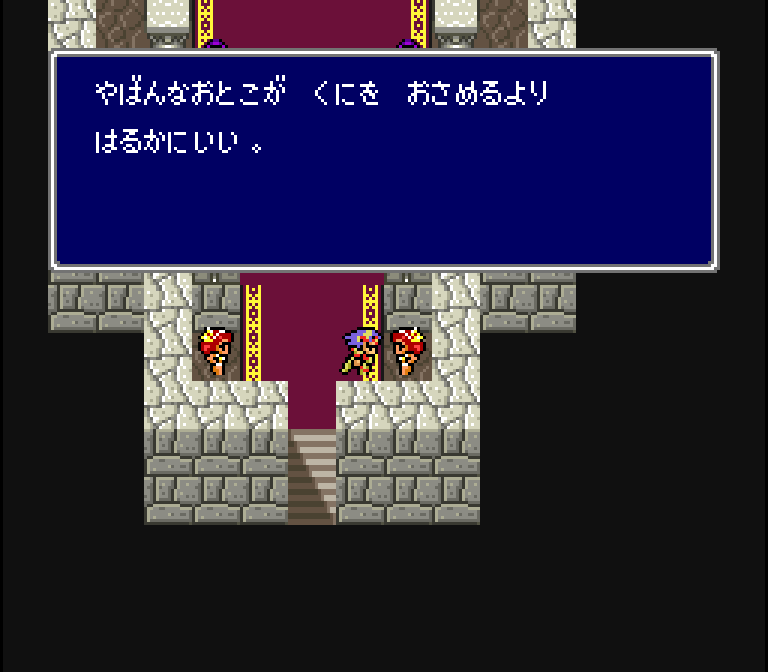 | 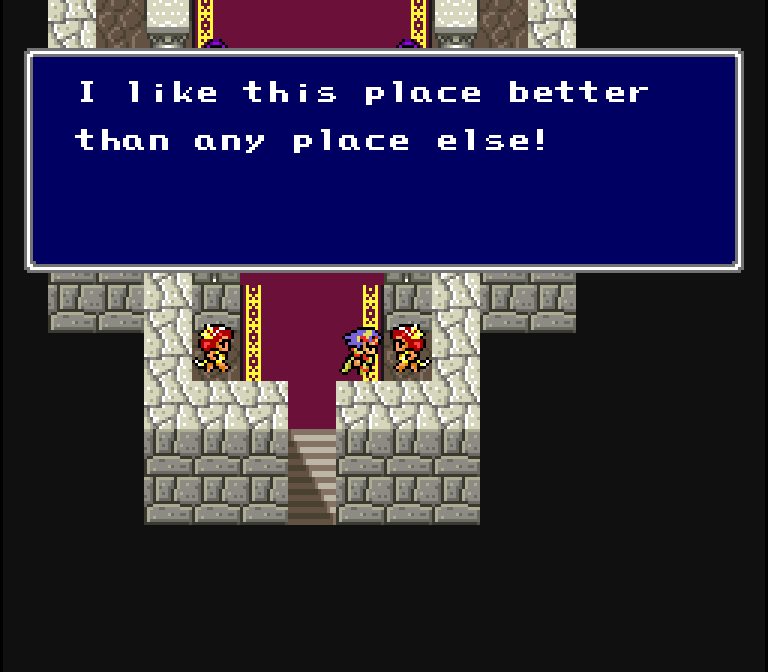 |
| Final Fantasy IV (Super Famicom) | Final Fantasy II (Super NES) |
The other leotard lady here talks about the kingdom:
| Japanese Version (basic translation) | English Version |
| This is MUCH better than having savage men running the country. | I like this place better than any place else! |
Wow, that’s a pretty big difference! I’m not sure how it would’ve come about; it feels like it was changed on purpose. Maybe someone felt it was too controversial in some way?
There was a line or two back in the city of Toroia that had similar “men are bad!” things written around or left out. I wish I could ask the localization team about this.
That Thieving Elf
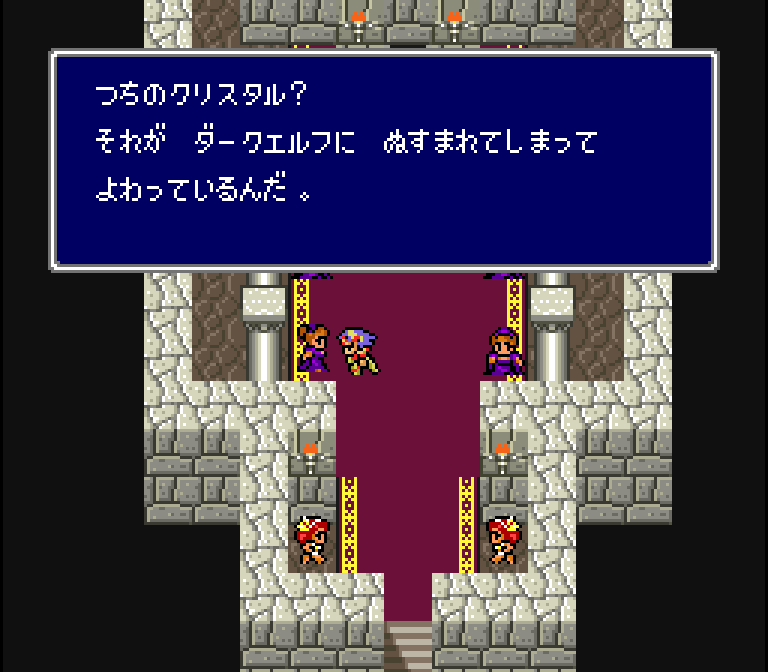 | 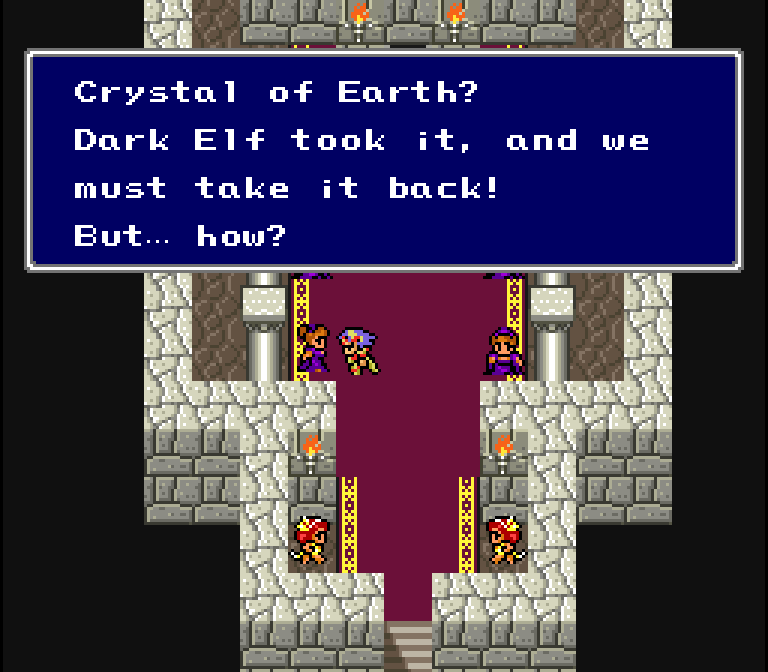 |
| Final Fantasy IV (Super Famicom) | Final Fantasy II (Super NES) |
One of the priestesses, we’ll call her Priestess 1, talks about Toroia’s crystal and what’s happened to it:
| Japanese Version (basic translation) | English Version |
| The Earth Crystal? | Crystal of Earth? |
| Well, you see, the Dark Elf stole it from us and now we are at our wits’ end. | Dark Elf took it, and we must take it back! |
| But… how? |
The English translation has a few things of note:
- She calls him “Dark Elf” in the translation, but it comes off as little Japanglish-y that way, without a “the” there. Unless it’s literally his actual name given to him by his parents or something, but even then, I feel like a “the” in there would still make it sound more natural. I dunno, it’s such an unusual situation that maybe it doesn’t matter anyway. That’s just my first impression of it.
- In the Japanese version, she doesn’t seem especially intent on getting it back. More than anything, she’s just lamenting the fact that it’s been stolen. It gives the feeling of, “There’s nothing we can do now.” basically. In the English version, she has a much more proactive attitude about it all.
- The final line in the English translation wasn’t in the original text.
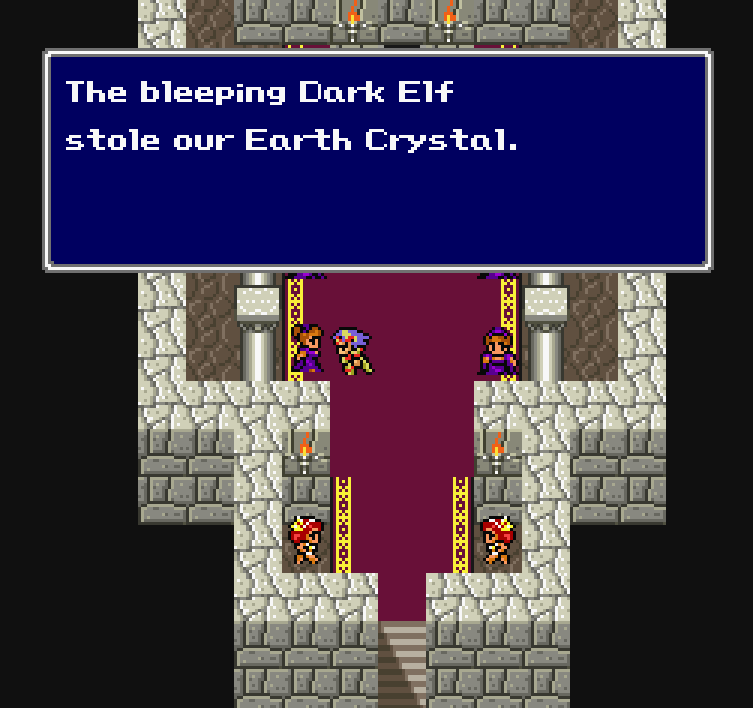
The PlayStation translation decides to go a whole different route with this priestess’ attitude:
The bleeping Dark Elf stole our Earth Crystal.
Wow. That’s… wow.
I often wonder if the initial draft of the PlayStation translation might’ve had swearing in it, and then a second draft replaced it all with things like “bleeping”. Or if all this fake swearing was done on purpose for comedic purposes.
In any case, the original text had nothing like this going on, so there was no need for swearing or humor in this line. I can’t see such a serious, powerful, respectable character talking this way at all.
I’m So Lost
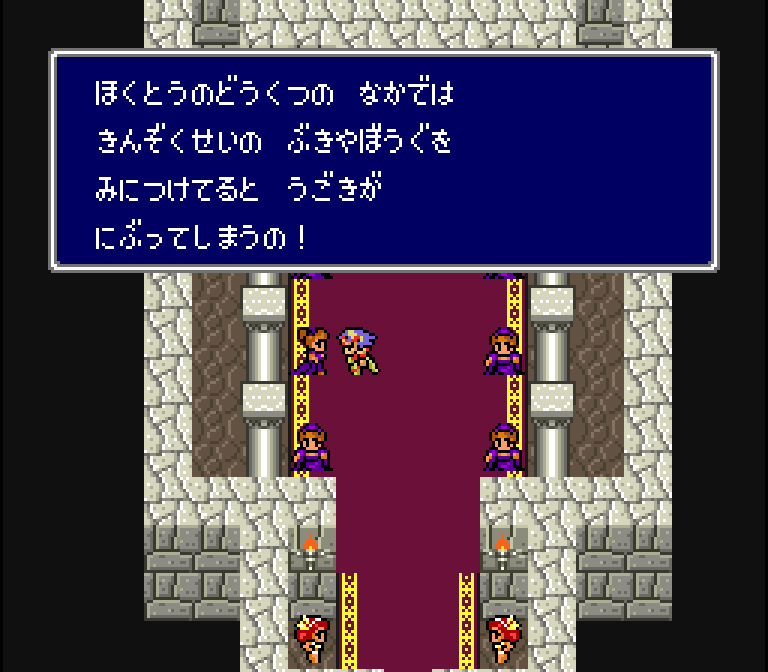 | 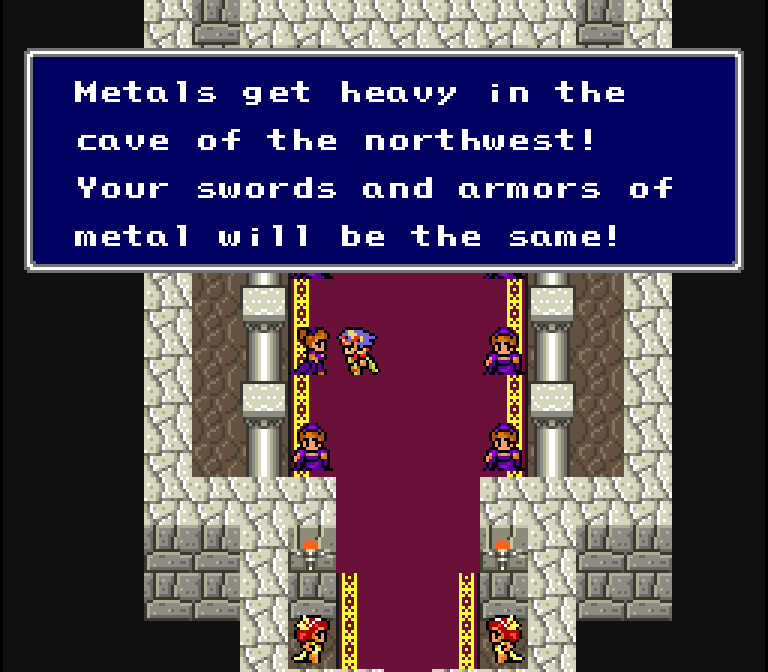 |
| Final Fantasy IV (Super Famicom) | Final Fantasy II (Super NES) |
Priestess 2 talks about a strange cave in the area:
| Japanese Version (basic translation) | English Version |
| Wearing metal weapons and armor inside the cave to the northeast will make it difficult to move! | Metals get heavy in the cave of the northwest! Your swords and armors of metal will be the same! |
Wow, that’s an awkward-sounding translation.
The biggest thing of all, though, is that the official release has a legitimate mistranslation here – the cave is to the northEAST, not the northwest.
Now that I think about it, I do think this tripped me up when I first played it as a kid, but only for a tiny bit. The cave in question was still pretty close to Chocobo Village, so I found it eventually.
Still, you can chalk that up as another genuine mistranslation in the original release!
Getting Directions
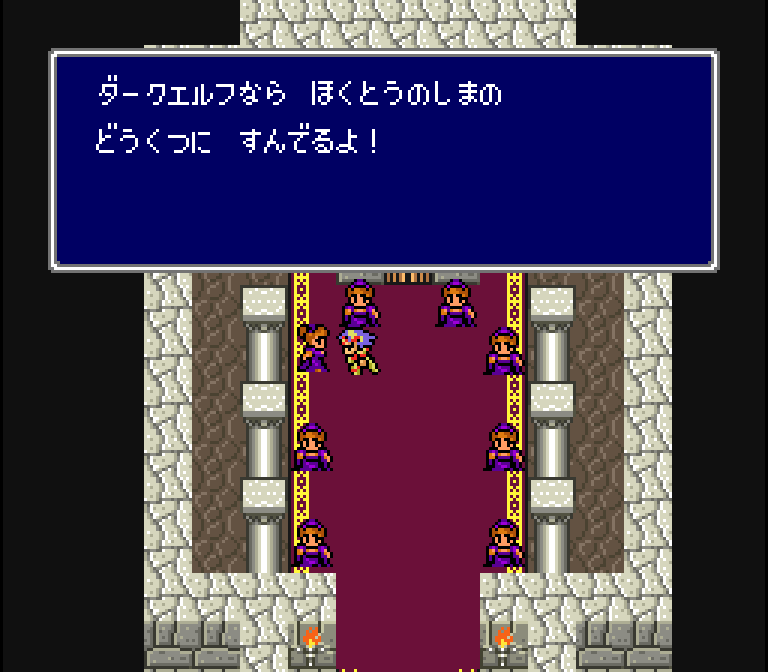 |  |
| Final Fantasy IV (Super Famicom) | Final Fantasy II (Super NES) |
Priestess 3 also talks about a cave:
| Japanese Version (basic translation) | English Version |
| If you’re looking for the Dark Elf, he lives in a cave on the northeast island! | Dark Elf is in a cave on an island over in the northeast. |
Weird! The previous line had “northeast” mistranslated, but this line said by the very next NPC gets it translated right.
In Japanese, this priestess talks in a very slightly less formal way than you’d expect, and she ends her sentence with an exclamation mark. The English translation doesn’t really reflect that.
When I say she talks slightly less formally, I really mean do mean “slightly”. Like, so slight that it’s almost not even noteworthy.
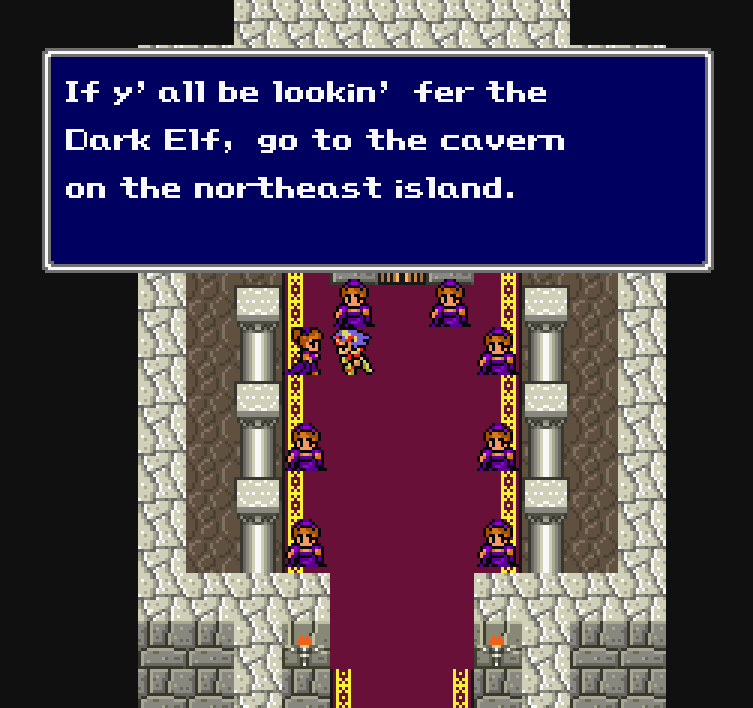
I wouldn’t have even brought it up except that the PlayStation translator seems to have handled it in an interesting way:
If y’all be lookin’ fer the Dark Elf, go to the cavern on the northeast island.
Holy crap she turned into a yokel!
This Dark Elf talk also makes me wonder – if there’s a Dark Elf, where are all the normal elves? Is there just one elf in the whole world? Or is Dark Elf just the name this guy and/or creature calls himself maybe?
What a Waste
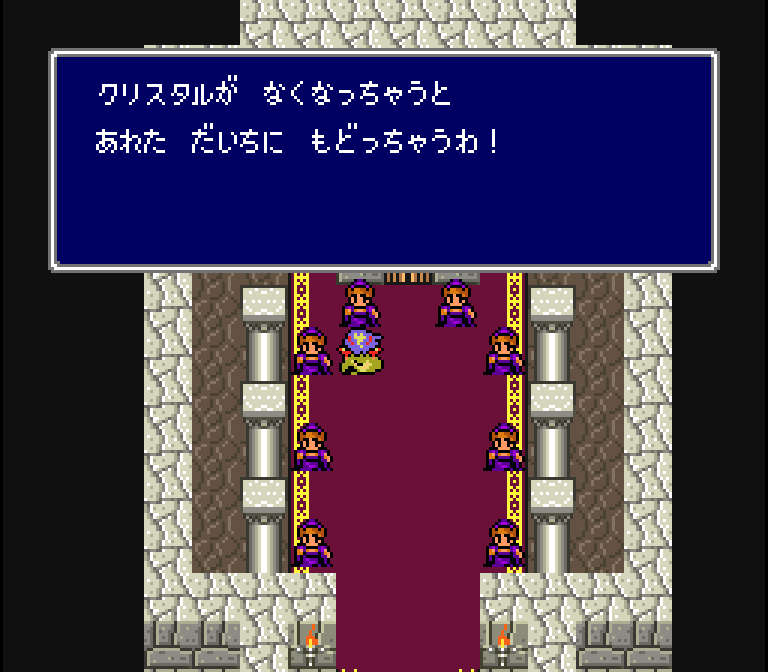 | 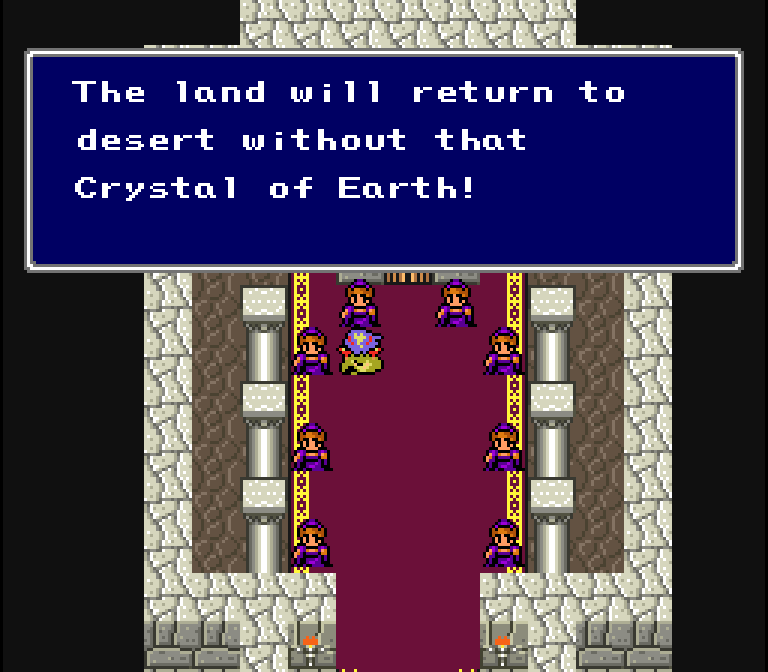 |
| Final Fantasy IV (Super Famicom) | Final Fantasy II (Super NES) |
Priestess 4 talks about what’ll happen without the Earth Crystal:
| Japanese Version (basic translation) | English Version |
| Without the crystal, the land will return to a wasteland! | The land will return to desert without that Crystal of Earth! |
Again, the specific name of the crystal is mentioned in the translation, while the Japanese text writers assumed it would be clear enough from context.
I’m also intrigued by the choice of “desert” here. It’s not exactly wrong, and it’s even a good way to say the same sort of thing with fewer letters. All later translations, including the fan translation, stick with “wasteland” here.
I guess this area used to be a wasteland until the Earth Crystal was used to make it the vibrant, lush place it is today. I never really stopped to consider that until now, maybe it’s because this one line is the only real mention of it.
Final Physics IV
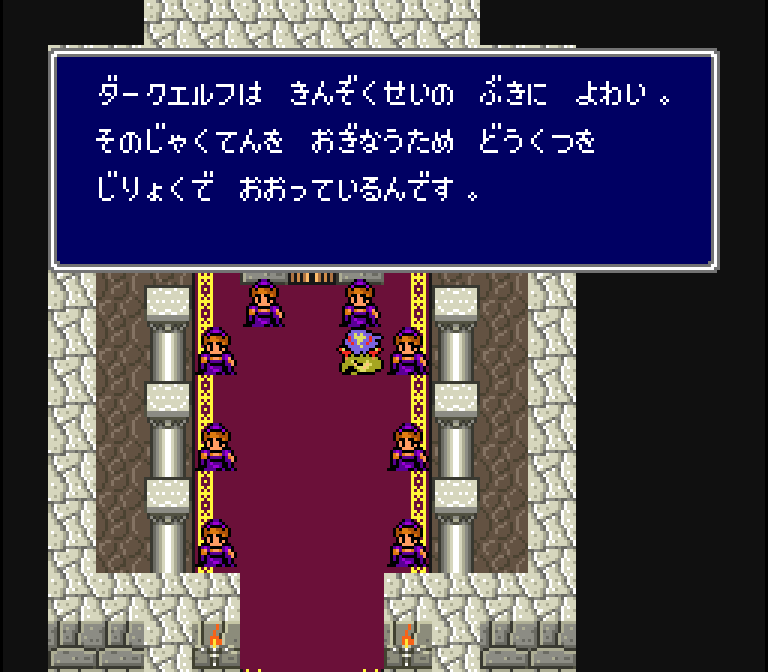 | 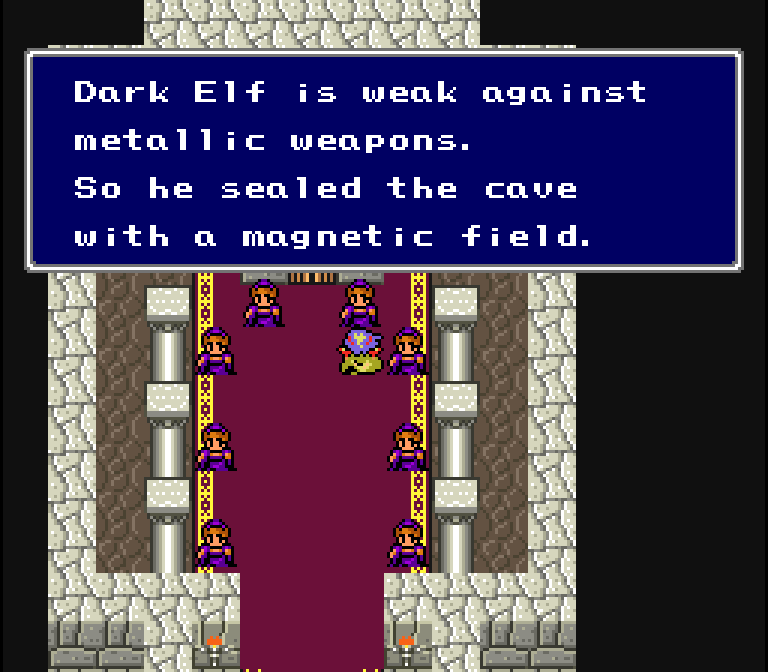 |
| Final Fantasy IV (Super Famicom) | Final Fantasy II (Super NES) |
Priestess 5 talks more in detail about the Dark Elf and his cave:
| Japanese Version (basic translation) | English Version |
| The Dark Elf is weak against metal weapons. | Dark Elf is weak against metallic weapons. |
| To compensate for that weakness, it has covered the cave with magnetism. | So he sealed the cave with a magnetic field. |
The use of “seal” and “magnetic field” here, both of which weren’t exactly in the original text, makes me think a native speaker helped edit this line in some way. This line is actually handled pretty well in translation – aside from the “the” thing mentioned before, I actually think this translation is a bit better than the original text.
Actually, off the top of my head, I’m not sure if the Dark Elf’s gender is ever specified in the Japanese script. It looks like the English translation just assumes it’s a “he”. Maybe we’ll find out more later.
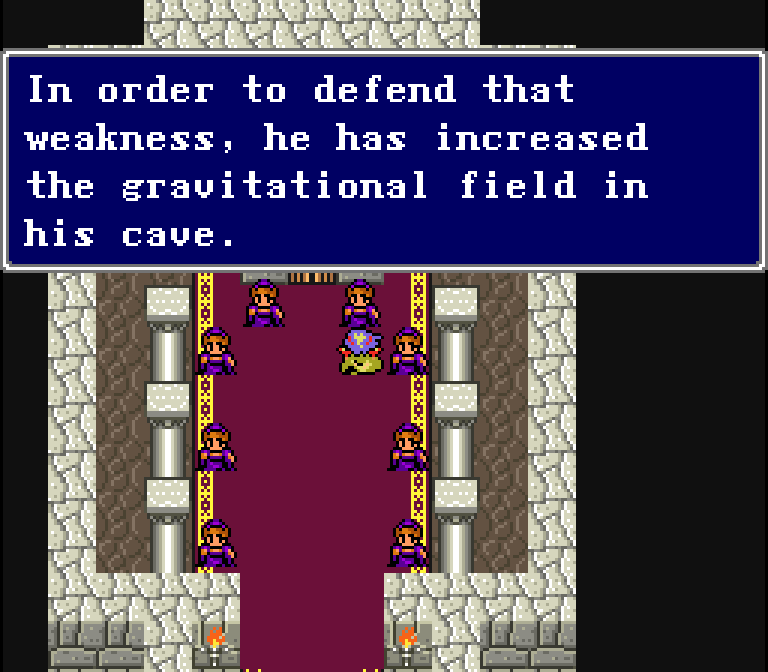
Anyway, the J2E fan translation translates this line as:
Dark Elf is weak against metal weapons.
In order to defend that weakness, he has increased the gravitational field in his cave.
There are definitely some things of note here:
- It looks like the fan translation also goes with just “Dark Elf” instead of “The Dark Elf”. That’s fine, since it ultimately comes down to interpretation and preference.
- The phrase “to defend that weakness” seems really strange in reference to a weakness that isn’t a location. Plus, to defend it would mean it needs protection, but that’s the opposite of what the Dark Elf would want. I feel “defend against” might be a better choice of words. The original Japanese text just says “compensate” or “make up for” anyway.
- I feel the use of “In order to” in this particular case also gives off a very unpolished, translation-ese feeling.
- Lastly, the fan translators unquestionably made a mistranslation here. It’s a pretty simple one: they mistook “jiryoku” (magnetism) for “juryoku” (gravity). But surely big fans of the game would’ve realized this mistake? Especially if it went through multiple editors and team members? And why would gravity only affect metal stuff anyway?
In all, this is just so full of oddities that I can’t help but wonder what happened.
A Promise
 | 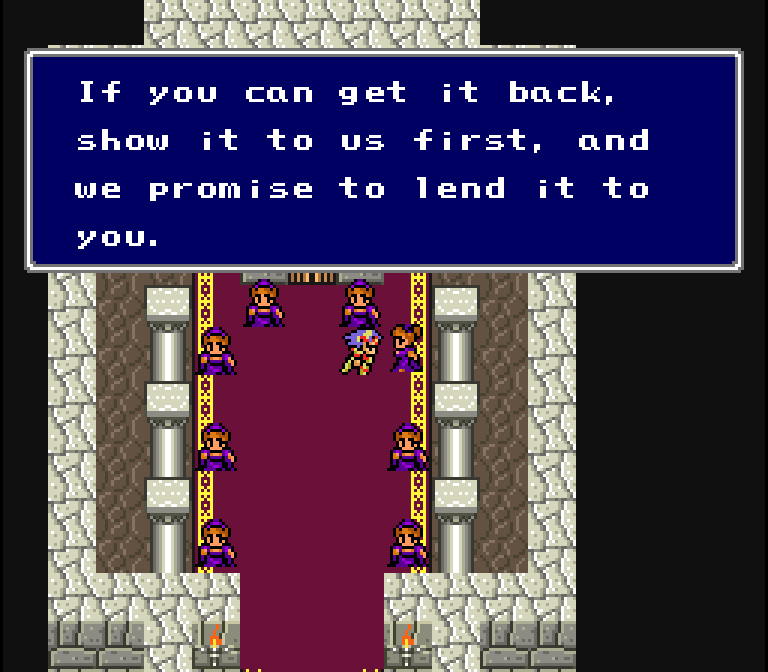 |
| Final Fantasy IV (Super Famicom) | Final Fantasy II (Super NES) |
Priestess 6 talks about getting the crystal back:
| Japanese Version (basic translation) | English Version |
| If you can take back the crystal, we will promise to lend it to you. For now, please bring it here. | If you can get it back, show it to us first, and we promise to lend it to you. |
The English translation stuffs everything into one sentence, which is fine. It actually sounds like this line might’ve had an editor take a look at it and rephrase things a bit. But what mostly stands out here is that the English translation doesn’t mention what she’s talking about.
I guess the translators assumed the player would know she was referring to the crystal… but that seems strange given that every other mention of the crystal was usually made more specific than the original Japanese text.
So my best guess is that the translators rushed through this line and forgot to include the mention of the crystal. That, or an editor accidentally removed the crystal mention while rephrasing and/or slimming the text down.
Good Only
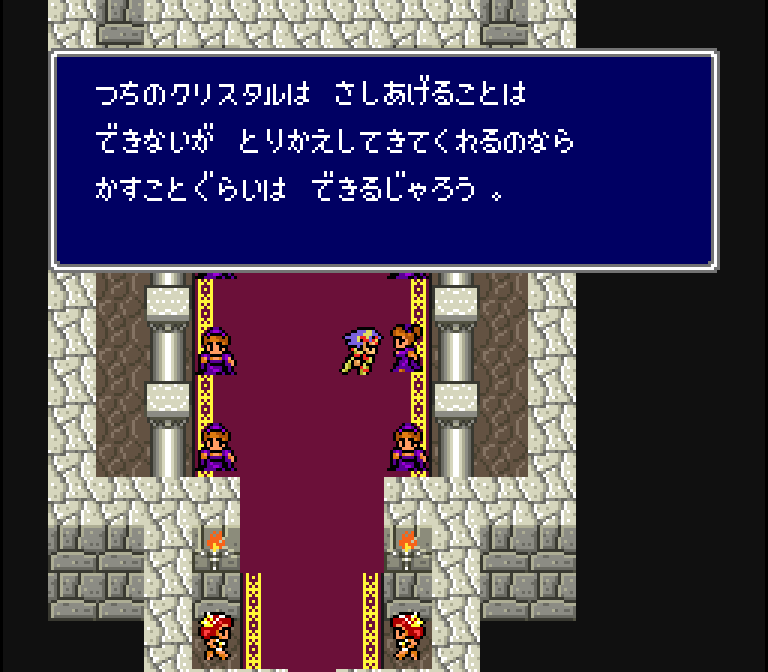 |  |
| Final Fantasy IV (Super Famicom) | Final Fantasy II (Super NES) |
Priestess 7 also talks about getting the crystal back:
| Japanese Version (basic translation) | English Version |
| We cannot give you the Earth Crystal, but if you will retrieve it for us then I’m sure we can at least lend it to you. | You cannot have it, but if you can take it back, you may use our Crystal of Earth for a good purpose. |
For the most part this translation is pretty good. The only thing that really stands out is that she adds an extra condition in the English translation.
In other words, the English priestess will lend the crystal on two conditions: that Cecil and friends can retrieve it and that they use it for a good purpose.
In the Japanese version, she only has one condition: that Cecil and company retrieve the crystal. There’s no mention of using it “for a good purpose” at all.
Blessed Land
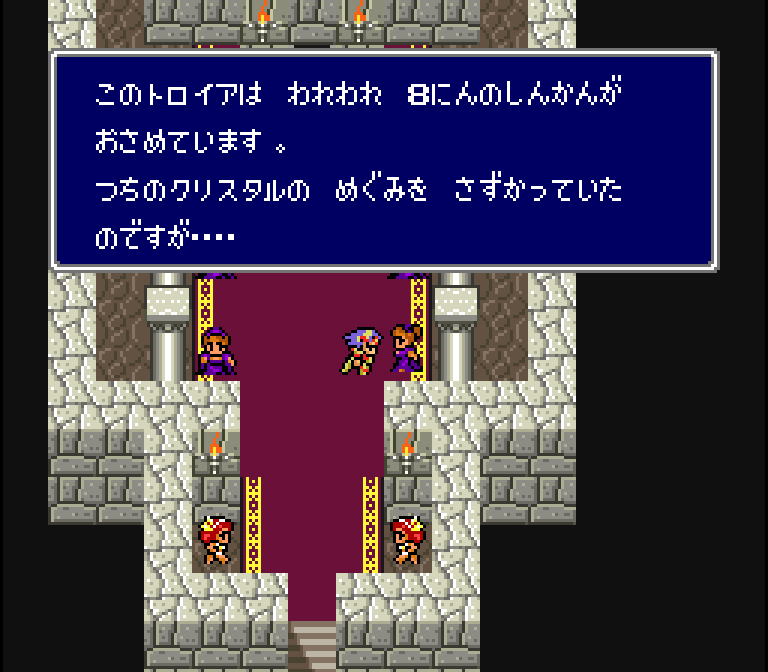 | 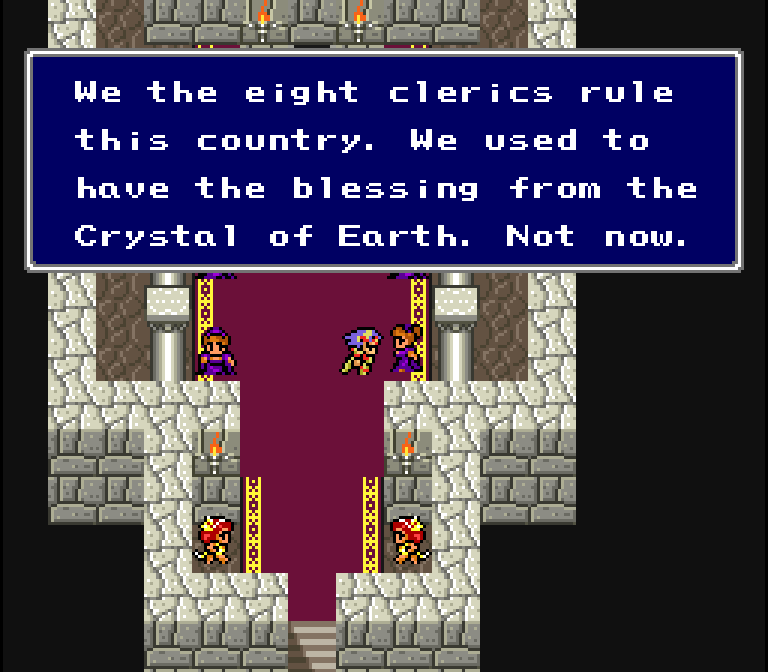 |
| Final Fantasy IV (Super Famicom) | Final Fantasy II (Super NES) |
Priestess 8 rounds out this visit with some info about the kingdom:
| Japanese Version (basic translation) | English Version |
| We eight priestesses rule over this land of Troia. | We the eight clerics rule this country. |
| We used to receive the blessings of the Earth Crystal, but…. | We used to have the blessing from the Crystal of Earth. Not now. |
This line strikes me as one that definitely got touched-up by an editor later on. It feels a lot like the king of Fabul’s text for some reason. Maybe it’s the fact that:
- The translation has been rephrased and/or whittled down just a tiny bit from a literal translation, with things like “Not now.” added and the mention of Toroia removed.
- The full line has been carefully edited to fit into a single text box, even though doing so meant stripping out some commas at the very start.
- Until now, “Clerics” was always capitalized. Not now.
Treasure This
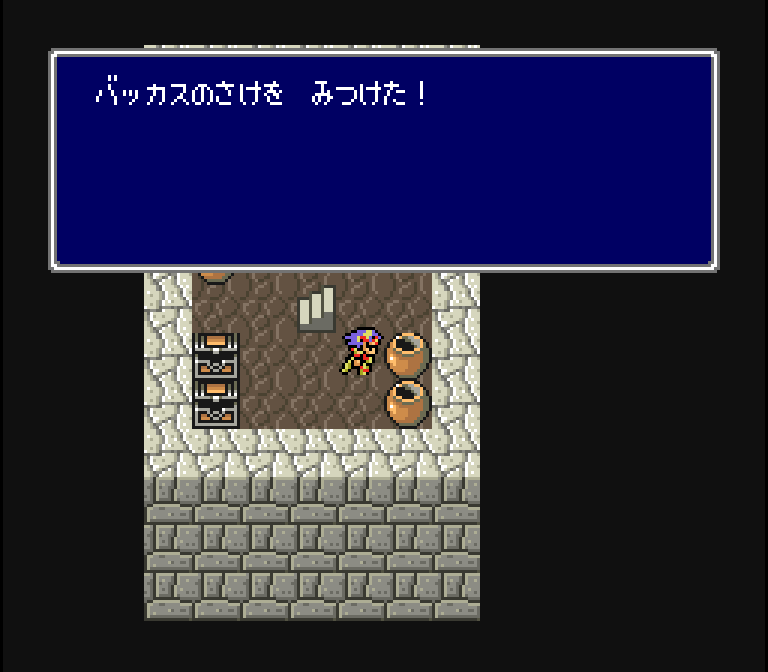 | 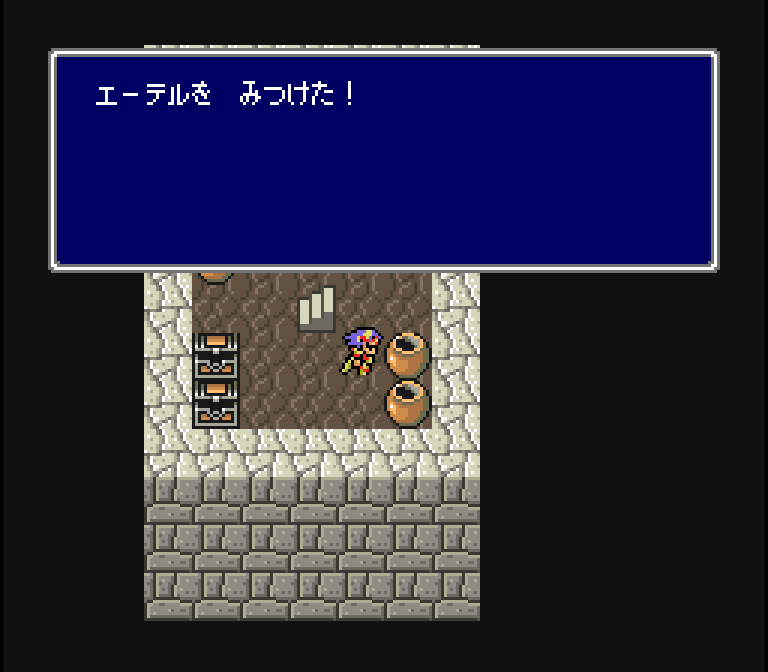 | 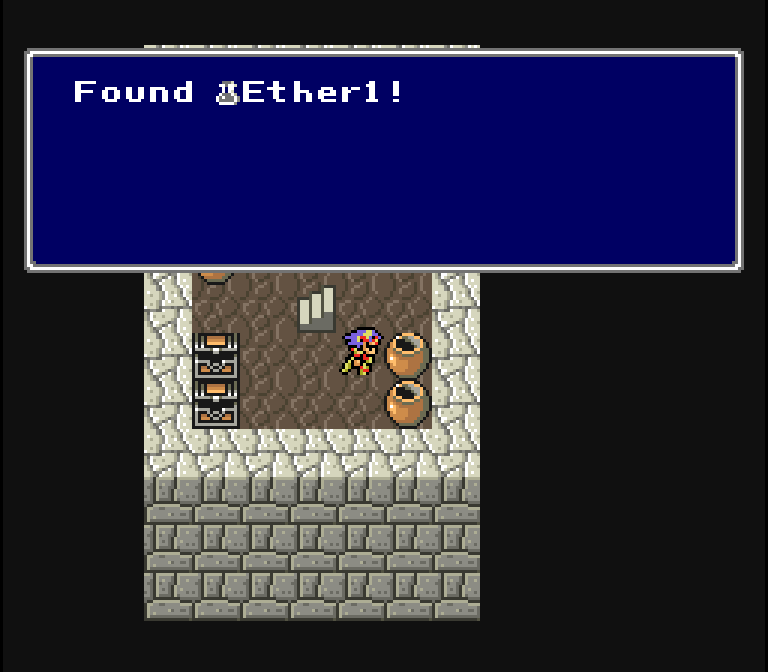 |
| Final Fantasy IV (Super Famicom) | Final Fantasy IV Easy Type (Super Famicom) | Final Fantasy II (Super NES) |
There’s a good number of treasure chests in the castle, but surprisingly enough, only one of them was changed for Easy Type and Final Fantasy II:
| Location: | Final Fantasy IV | Final Fantasy IV Easy Type | Final Fantasy II |
| BF1 | Bacchus’ Wine | Ether | Ether1 |
Let Me In!
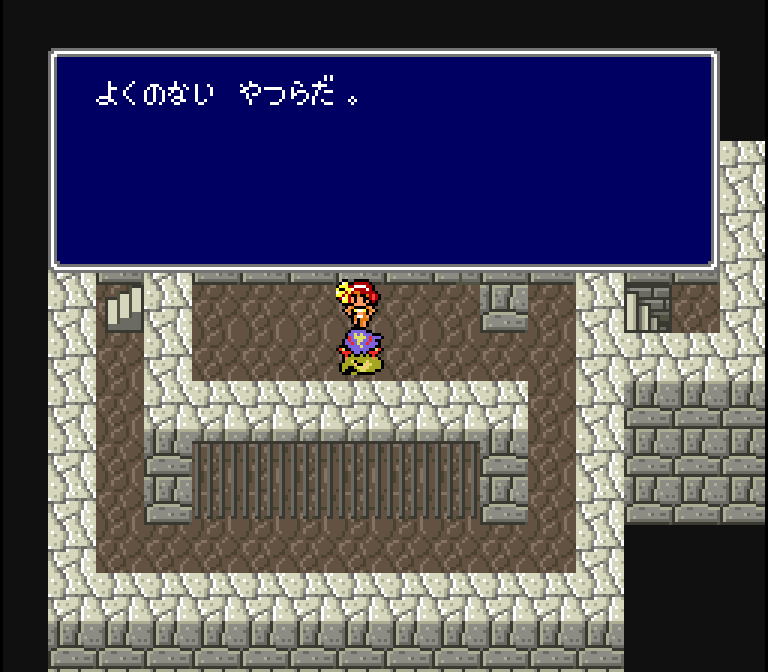 | 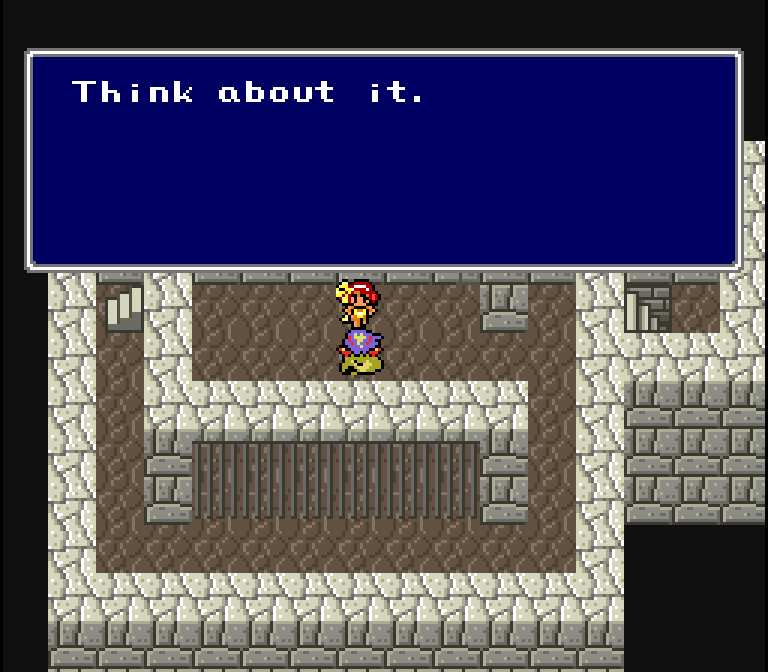 |
| Final Fantasy IV (Super Famicom) | Final Fantasy II (Super NES) |
There’s a lady guarding the castle’s main treasure vault. She’ll ask if you’ve been given permission to enter, and you get to answer with a “Yes” or a “No”.
If you say that you haven’t been given permission, in Japanese she’ll say something like, “You guys are unselfish.” or “You guys aren’t greedy.” It could also possibly be taken as, “You guys aren’t ambitious.” but that seems less likely to me.
In English, she says, “Think about it.”
…I really have no idea what that’s supposed to mean or why it was translated that way.

Incidentally, if you say “yes” to her in the fan translation, she’ll say, “And you expect to get in?”
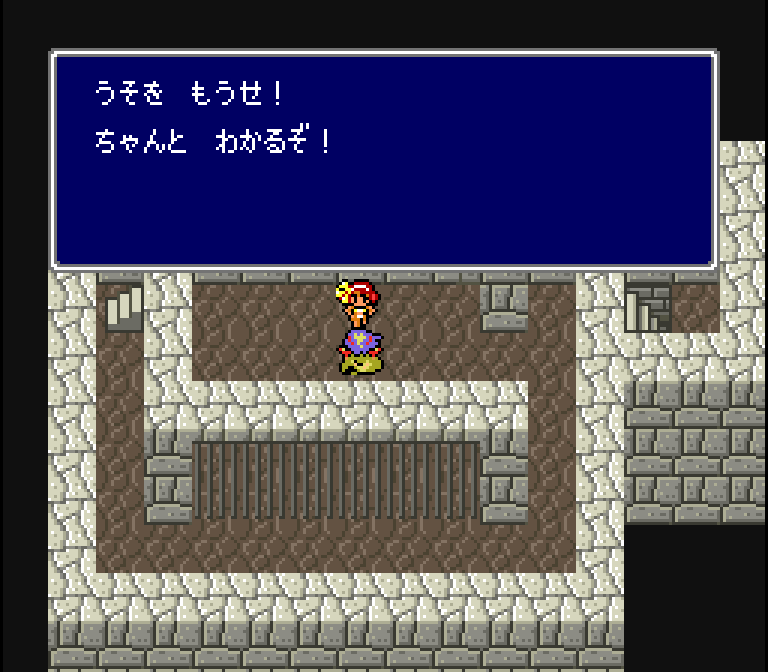 | 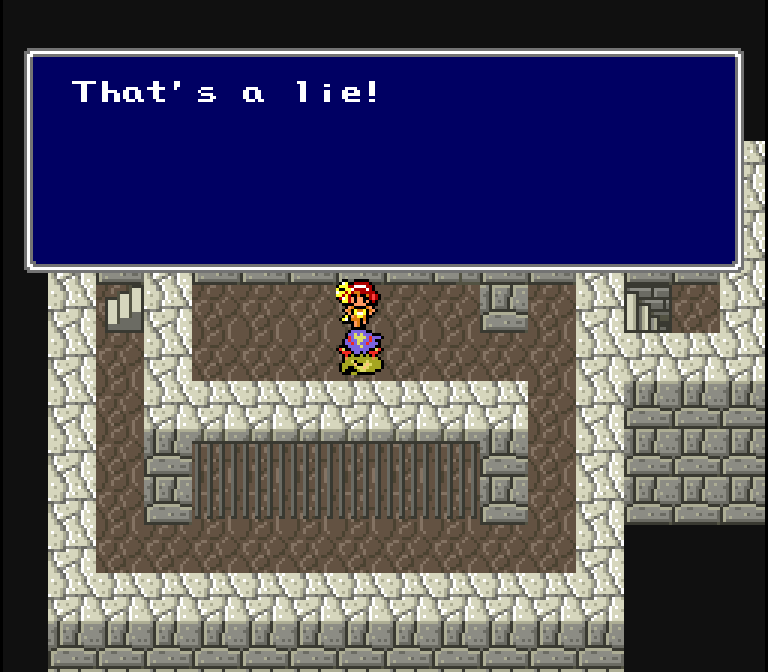 |
| Final Fantasy IV (Super Famicom) | Final Fantasy II (Super NES) |
If you say that you have been given permission when you actually haven’t, in Japanese she’ll say something like, “Liar! I can tell!” or “You lie! You can’t fool me!”
In the official English translation, she says only the first half: “That’s a lie!”
Also, just as an aside, she (like many of the other women in this castle) talks in an unusual, manly way in Japanese.
Sick Sleep
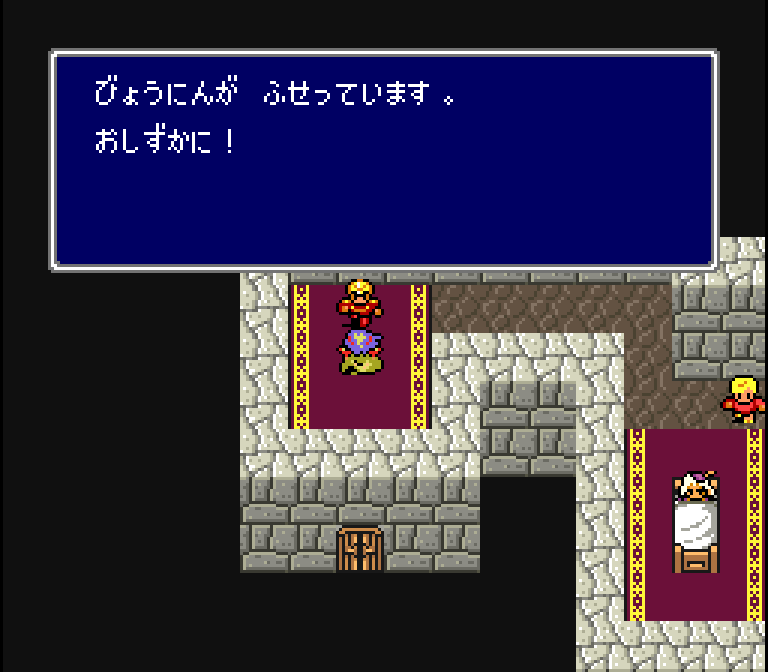 | 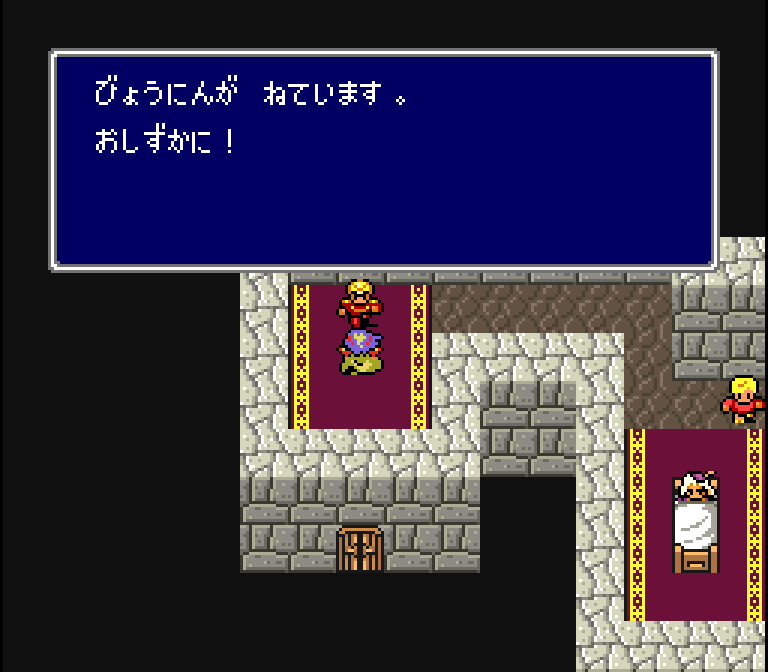 | 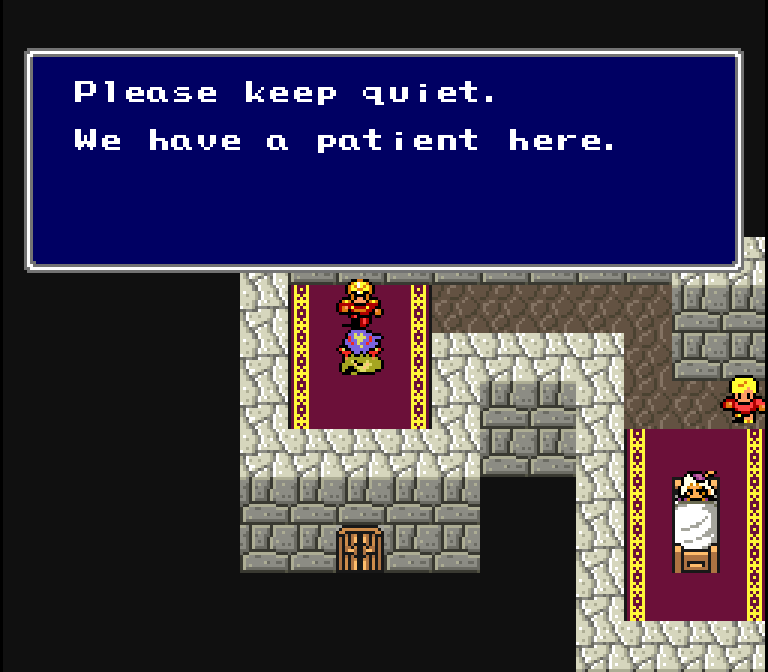 |
| Final Fantasy IV (Super Famicom) | Final Fantasy IV Easy Type (Super Famicom) | Final Fantasy II (Super NES) |
Inside a special room there’s a guard:
| Final Fantasy IV (basic translation) | Final Fantasy IV Easy Type (basic translation) | Final Fantasy II (Super NES) |
| A patient is resting. Please keep quiet! | A patient is sleeping. Please keep quiet! | Please keep quiet. We have a patient here. |
The Easy Type script was modified slightly here, again for easier understanding. It’s hard to convey in translation, but the original word is a little fancier and has a number of homonyms, so changing it makes it much clearer for kids.
The English translation is pretty okay. I can’t tell if the exclamation at the end of the original text was meant to be ironic or not, but if so, then the translation doesn’t include that bit of humor.
Edward Again
 | 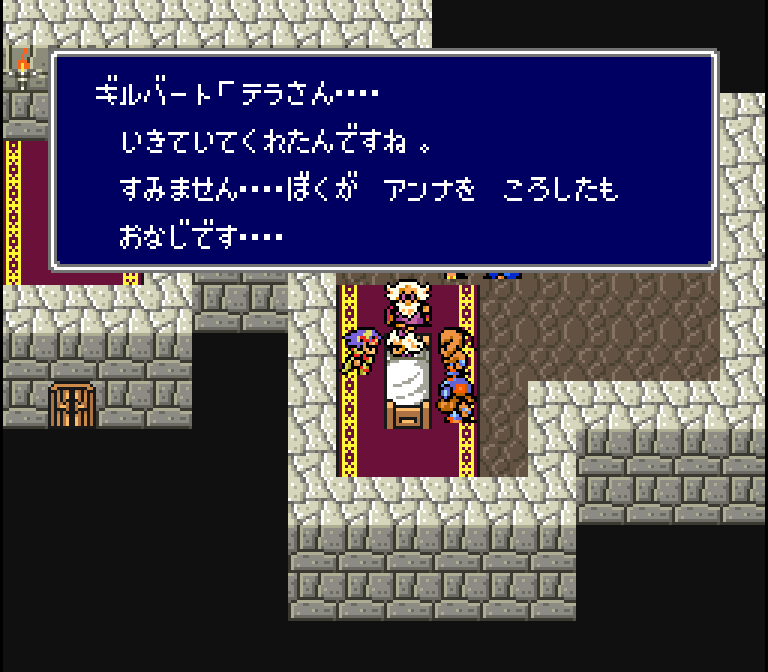 | 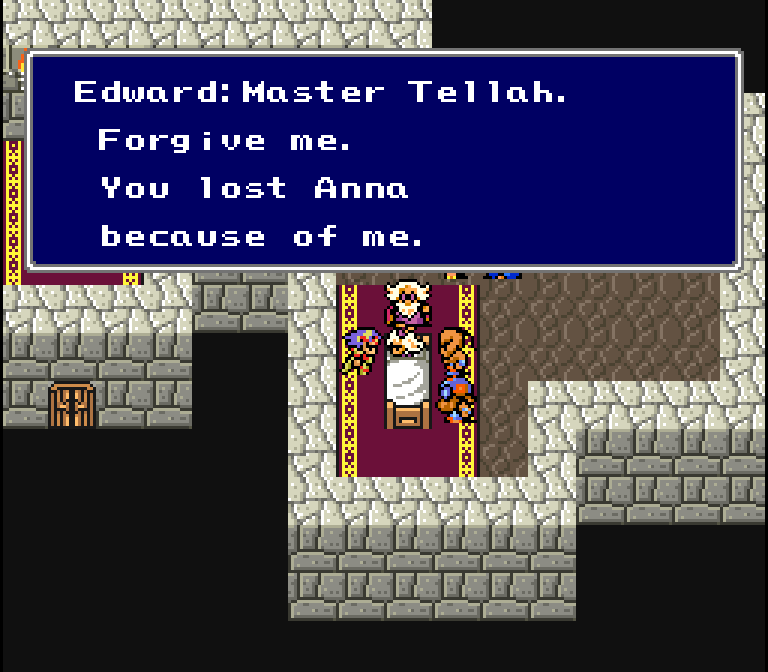 |
| Final Fantasy IV (Super Famicom) | Final Fantasy IV Easy Type (Super Famicom) | Final Fantasy II (Super NES) |
Oh, it looks like the mysterious guy from Damcyan who washed up here is Edward! It’s time for a reunion scene.
| Japanese Version (basic translation) | English Version |
| Cecil: Gilbert! | Cecil: Edward! |
| Gilbert: Cecil…. You’re alive. I’ll…. fight too…. | Edward: Cecil… So you are alive. Let me join you. |
| Tella: What can you possibly do in your condition!? Just be quiet and get some rest! | Tellah: What can you do in such a wretched condition! Lie in bed quietly! |
| Gilbert: Mr. Tella…. You’re alive. | Edward: Master Tellah. |
| I’m sorry…. I practically killed Anna myself…. | Forgive me. You lost Anna because of me. |
| Tella: …. | Tellah: … |
| Gilbert: I’m really…. uu…. | Edward: Really. |
| Yang: Sir Gilbert. You must concentrate on your health for now…. | Yang: Prince Edward, think only of your health now. |
| Gilbert: Yang…. You’re all right too. | Edward: Yang… So you too survived that Leviatan attack. |
| Does that mean Rydia is also….? | Then Rydia? |
| Yang: I am sorry…. | Yang: Sorry. |
| Gilbert: I see…. The poor girl…. | Edward: Poor Rydia. |
| You’re all fighting, and yet…. I’m so pathetic…. | And I can’t do anything while you fight. It’s a shame. |
| Cid: Don’t you worry! They got Cid and the Enterprise with ’em! | Cid: Don’t worry! Me and my Enterprise will take your share! |
| I heard you helped Cecil and Rosa and others out! | I’ve heard you had taken good care of Cecil and Rosa. |
| So just leave it to me now! | Now it’s my turn! |
| Gilbert: You’re Cid? | Edward: You are that Master Engineer Cid? |
| Does that mean you managed to get an airship…. | Then you have an airship! |
| !! | |
| Cecil! What became of Rosa? | Cecil! Where is Rosa? |
| Cecil: We’re now to trade her for Troia’s Earth Crystal…. | Cecil: She was caught in exchange for the Crystal of Earth at Toroia. |
| But the Dark Elf has the crystal…. | But the crystal is now in the hands of the Dark Elf. |
| Gilbert: Dark Elf…. | Edward: Dark Elf… |
| Cecil. Take this with you…. | Cecil, take this… |
| Cecil: What is it? | Cecil: What’s this? |
| Gilbert: It’s my replacement…. Take it with you…. | Edward: Say… my substitute… It may help… |
There’s a lot of text here, and although there aren’t any huge, glaring differences, let’s take a peek at some of the smaller tidbits:
- The word “killed” was rephrased to use the word “lost” instead. The “oomph” of the line is still surprisingly strong, though, even with this change.
- A lot of the punctuation was removed, especially the ellipses. This is common in Japanese-to-English localizations, but given that Edward is sick and weak, I feel it would’ve been fine to leave them in. It wouldn’t have felt out of place.
- Given the punctuation changes and some of the English phrasing, it’s clear that this scene had definitely been touched up by an editor later on.
- Some of the issues that occur with after-the-fact editors happen here. For example, the “Really.” line in the translation was meant to be the start of a sentence in which Gilbert/Edward is saying something like, “I’m really…” but is unable to finish the sentence. This sort of editing mistake is common when an editor doesn’t have access to and/or can’t understand the source text. EarthBound’s localization had a couple such instances too, like this one, for example:
![I guess citing EarthBound stuff is becoming a theme of this analysis. EarthBound is always proving to be neat in new ways! I guess citing EarthBound stuff is becoming a theme of this analysis. EarthBound is always proving to be neat in new ways!]()
![I guess citing EarthBound stuff is becoming a theme of this analysis. EarthBound is always proving to be neat in new ways! I guess citing EarthBound stuff is becoming a theme of this analysis. EarthBound is always proving to be neat in new ways!]()
MOTHER 2 (Super Famicom) EarthBound (Super NES) - Yang calls Gilbert by a generic “Sir”-ish title in Japanese, while he calls him “Prince” in the translation. That’s some good thinking on the translators/localizers’ part.
- Similarly, Edward calls Cid “Master Engineer Cid” in the translation, while he just calls him “Cid” in the Japanese script, without any name modifiers at all.
- The Leviathan attack is brought up in the English translation, but it’s never specifically mentioned in the original text. I think the original writers felt it didn’t need to be spelled out for the player.
In the English version, Edward says at one point, “It’s a shame.” This is fine, but whenever I see or hear that phrase it’s usually meant in an ironic way, so my mind goes that way first. So it kind of gives Edward this unintended vibe of, “Boy, I’d sure love to help you fight, but, uhh, I’m not feeling so great. Yeah. So you can go on ahead without me.”
Of course, that’s not what the translators intended and I might be the only one who might read it that way, but I thought I’d mention it anyway. As a translator, it’s tough to anticipate unintended double-meanings sometimes.
- “She was caught in exchange for the Crystal of Earth at Toroia” has a common preposition mistake made by non-native English speakers. The line itself isn’t quite right either – she wasn’t originally caught for that purpose; that’s just the deal they eventually agreed upon. This is also an odd answer to give anyway, since Edward was right there when Rosa got kidnapped in the first place.
- I never quite understood what Edward was saying with, “Say… my substitute…” The Japanese line is a lot clearer and sounds perfectly natural. So I guess the localizers’ approach with this line might’ve been better-phrased as, “Let’s call it my substitute…” or something like that.
The Easy Type version of the script has a few changes too. First is this line by Gilbert/Edward:
| Final Fantasy IV (basic translation) | Final Fantasy IV Easy Type (basic translation) |
| I practically killed Anna myself…. | I basically killed Anna myself… |
And the other is this line by Yang:
| Final Fantasy IV (basic translation) | Final Fantasy IV Easy Type (basic translation) |
| Sir Gilbert. You must concentrate on your health for now…. | Yang: Sir Gilbert. You must rest for now…. |
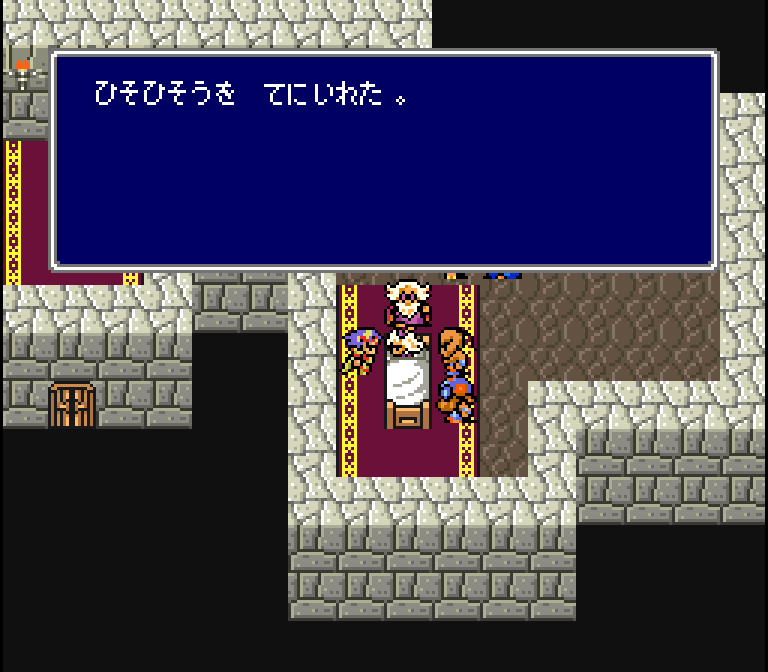 | 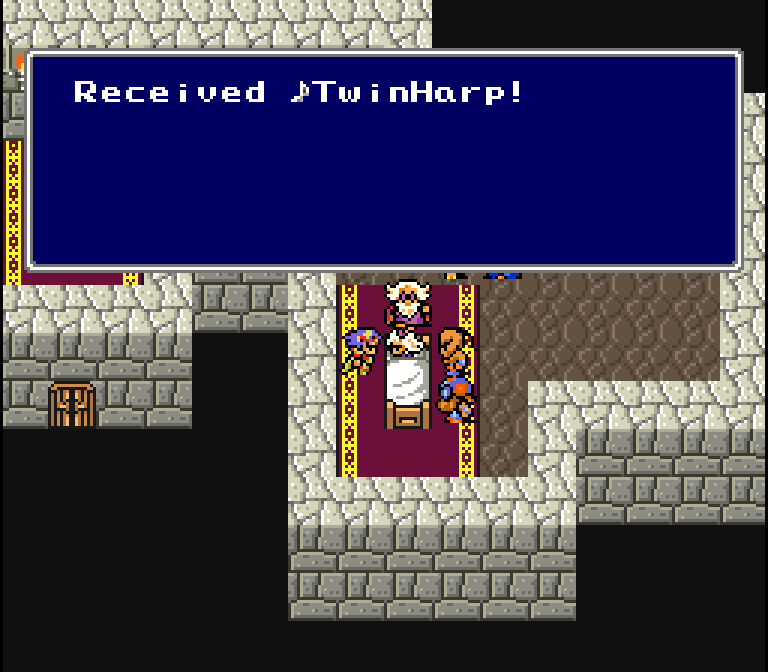 |
| Final Fantasy IV (Super Famicom) | Final Fantasy II (Super NES) |
After this, Cecil’s party receives a key item. As seen before, this is called something like “Whisper Grass” in Japanese but was renamed “TwinHarp” in English.
Doctor’s Orders
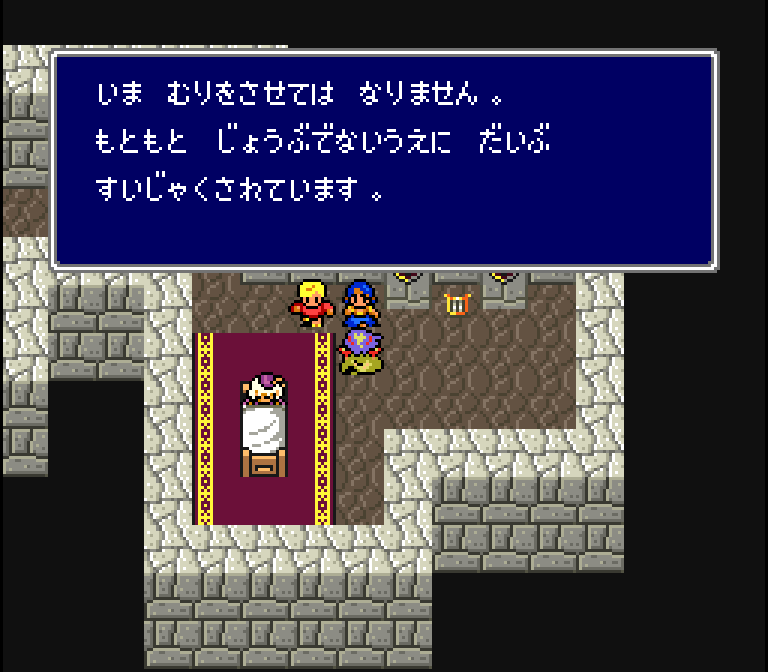 |  |  |
| Final Fantasy IV (Super Famicom) | Final Fantasy IV Easy Type (Super Famicom) | Final Fantasy II (Super NES) |
The doctor in the room speaks about Gilbert/Edward’s condition:
| Final Fantasy IV (basic translation) | Final Fantasy IV Easy Type (basic translation) | Final Fantasy II (Super NES) |
| He must not overexert himself right now. | He must not overexert himself right now. | He may not walk or get up until he’s all well. |
| Not only is he fragile to begin with, he’s also been debilitated quite a bit. | Not only is he fragile to begin with, he’s also been injured all over. | Don’t worry. We’ll take care of him. |
The English translation changes things almost entirely here. The first line is unclear in its meaning too; is it saying that he “might not walk or get up” or that he’s “not allowed to walk or get up”? I assume the latter, but the former is what my mind first goes to when reading it for whatever reason.
Also, as we can see, the Easy Type version of the script changes some of the wording to use slightly simpler terms.
The original line actually could be translated as “emaciated” rather than “debilitated” – there’s no single translation for the Japanese word. So it’s technically possible that the Easy Type version of the script changed what’s wrong with Gilbert here.

The PlayStation translation treats this line with:
He requires much rest.
He seems naturally frail, which explains his slow recovery.
This changes things up too, and I’m guessing that the translator didn’t want to commit to “emaciated, “debilitated”, or something else, so they just wrote around it instead.
At the very least, the PlayStation translation handles this line better than the Super NES translation.
Duplication Localization
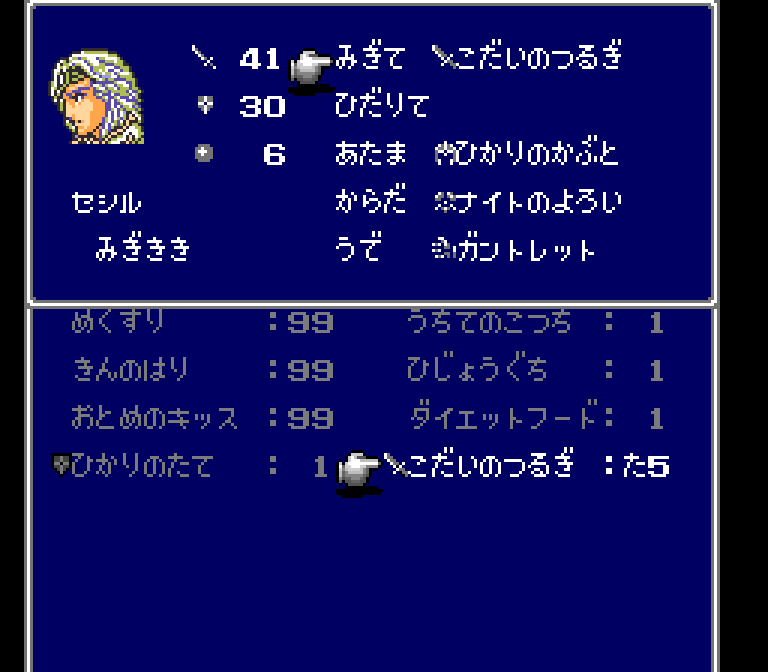 | 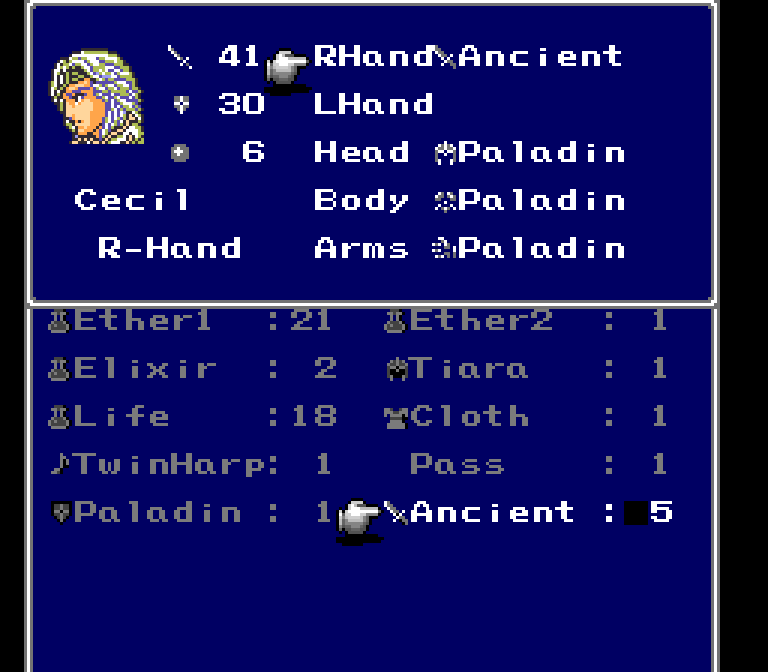 |
| Final Fantasy IV (Super Famicom) | Final Fantasy II (Super NES) |
For reasons I can’t remember, I felt the need to try one of the item duplication tricks at this point in the game. I think there’s actually more than one item duplication trick, this particular one gives you 255 of an item.
Anyway, this trick relies on a bug in the programming, and I quickly found out that although the trick works in both Final Fantasy IV and the English Final Fantasy II, the bug was fixed in Easy Type. This seems to further suggest that Easy Type was developed after or separately from the English version. So if you’ve ever read websites saying that the American Final Fantasy II is based off of Final Fantasy IV Easy Type, that’s not really the case. The full, absolute-for-certain, quotable details are still a little unclear to me, but hopefully I’ll figure it out eventually.
Also, due to the different fonts, when you get 255 of an item the garbled number looks a little bit different. The English version has a black square and the number 5, but the Japanese version has a hiragana “ta” and a number 5.


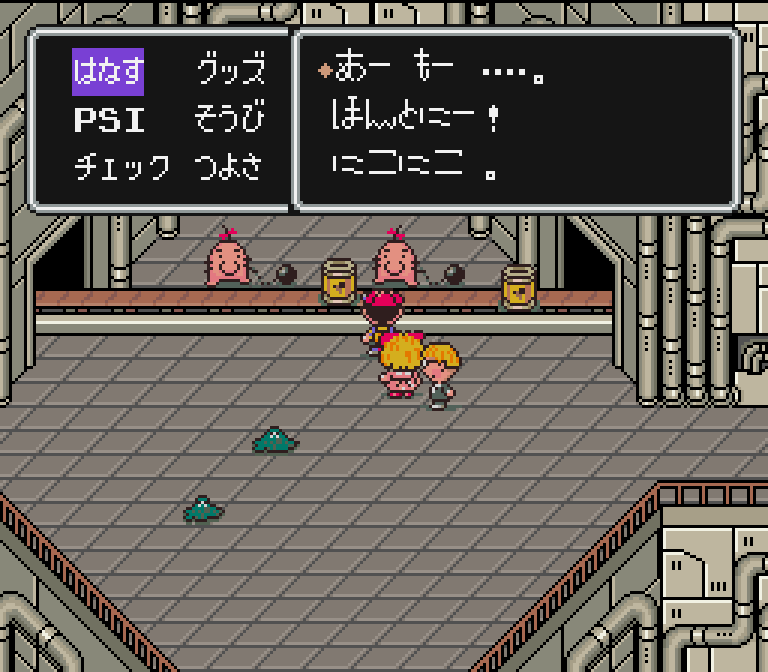
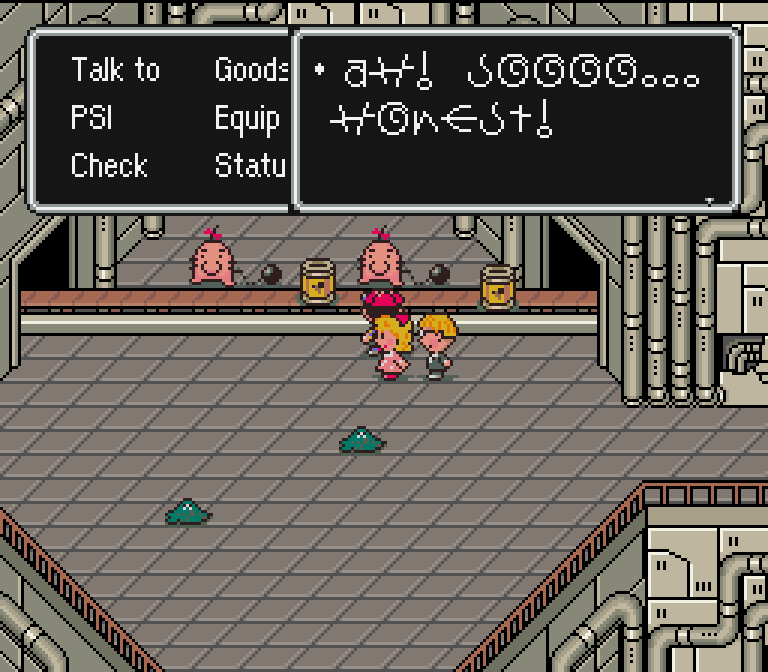
![press start to translate [Final Fantasy IV] press start to translate [Final Fantasy IV]](https://legendsoflocalization.com/wp-content/uploads/2019/08/bbenma.png)
No Comments